Mitchell Hadley's Blog: It's About TV!, page 96
May 8, 2021
This week in TV Guide: May 9, 1970

 Usually, when we talk about all-stars, it's in in the context of sports. But this week's lineup on David Frost's show is so star-studded, it doesn't give anyone else a sporting chance.
Usually, when we talk about all-stars, it's in in the context of sports. But this week's lineup on David Frost's show is so star-studded, it doesn't give anyone else a sporting chance.Frost's show, syndicated by Group W, is featuring an all-star week of single-guest programs: four reruns and one brand-new show. On Monday, the guest is Sammy Davis Jr.; Tuesday, it's Johnny Carson; Thursday, the Great One, Jackie Gleason; and Friday, a two-for-one with Richard Burton and Elizabeth Taylor.* These shows surround the Wednesday program, an all-new, exclusive conversation with Vice President Spiro Agnew. It's undoubtedly one of the best single-week lineups you're likely to see on any talk show—certainly now, when hosts can't fill up 60 minutes with a multiplicity of guests, but even back then, in the heyday of 90-minute TV talk, when the competition includes Carson, Griffin and Cavett. Fitting, then, that David Frost is on the cover this week.
*I know; technically two persons, but I always thought of Burton-Taylor (or Taylor-Burton) as representing a brand more than two individuals.
As Edith Efron points out, the Frost show is carried on "only" 70 stations nationwide, but it makes up for that with the amount of conversation it generates, and for a very good reason: "on the Frost talk show, people talk." His guests, which include "writers, artists, churchmen and politicians," seem to have found a level of comfort with Frost that causes them to share items (or "little confidences" as Efron describes them) that no other host seems able to achieve. "Richard Burton thinks Shakespeare smoked pot, that Liz wants another baby, that Johnny Carson is a good ventriloquist with a weird soprano voice, that Arthur Godfrey and Harve Presnell have had themselves sterilized, that the Archbishop of Canterbury feels the presence of God most intensely when he experiences serenity in the face of suffering, and that Raquel Welch thinks the mind is 'the most erogenous zone.'" No wonder Nixon talked to him after he left office.
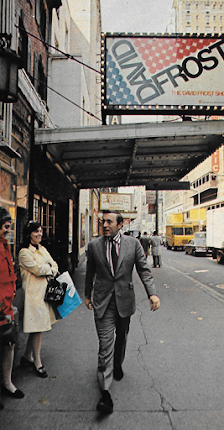 He's not everyone's cup of tea, though. His attentiveness, which works so sucessfully in drawing his guests out, can border on sycophantic. His favorite closing line, "It's been a joy having you here," has become the butt of jokes, and New York Times TV critic Jack Gould acidly described him as "deferential enough to be an assistant to a television vice president." Meanwhile, across the pond, the British, for whom Frost was a popular and dreaded satirist (That Was the Week That Was) with a reputation as fierce as Mike Wallace, wonder whether he's sold out to the cousins. Geoffrey Hobbs, TV critic for the London Evening Standard, says that the old frost would tear people apart. But now, "The David Frost interview started becoming a show-biz chat show—very pally. Now, he's gotten a bit plasticky—the smile too much in evidence. . ."
He's not everyone's cup of tea, though. His attentiveness, which works so sucessfully in drawing his guests out, can border on sycophantic. His favorite closing line, "It's been a joy having you here," has become the butt of jokes, and New York Times TV critic Jack Gould acidly described him as "deferential enough to be an assistant to a television vice president." Meanwhile, across the pond, the British, for whom Frost was a popular and dreaded satirist (That Was the Week That Was) with a reputation as fierce as Mike Wallace, wonder whether he's sold out to the cousins. Geoffrey Hobbs, TV critic for the London Evening Standard, says that the old frost would tear people apart. But now, "The David Frost interview started becoming a show-biz chat show—very pally. Now, he's gotten a bit plasticky—the smile too much in evidence. . ." This last part is up for debate. His friends insist he hasn't soften—as Clay Felker, editor of New York magazine puts it, "he uses a more sophisticated technique—of questioning people so that they hang themselves!" And British producer Peter Baker points out that TW3 was a scripted show, produced by a writing staff. "[I]t wasn't him talking!" (You'll notice that people around Frost tend to talk in italics a lot.) Others note that, like so many comic actors, Frost has simply traded in his comedic chops for a more serious milieu.
Whatever it is, it seems to agree with him. He works 19-hour days ("Why anyone should want to work this hard," says Britain's ambassador to the U.S. John Freeman, "is a mystery to me."), runs his own TV company, makes in excess of a million dollars a year, and travels in a $25,000 Bentley to expensive restaurants where he's dining with prime ministers, princesses, and jet-setters like Jackie and Ari. Producer Ned Sherrin says that "David would quite like to be Prime Minister—and the Queen and the Archbishop of Canterbury. But being only one would limit him a bit." Some suggest that he was anti-Establishment only because he wasn't part of it. A friend calls him "a complex, brilliant, enormously neurotic man."
Frost himself insists that he works hard because he likes it, that he doesn't have any hangups, and that he's perfectly happy being who he is and doing what he does. Still, good or bad, people are talking about him; one wonders whether or not he's one who believes that there's no such thing as bad publicity.
t t t
Speaking of talk shows as we have been, the Sunday morning political chatfest isn't my idea of entertainment, and I don't know if anyone feels any differently. But now I must stop viewing things like this through my current lens of cynicism, and return to the world of 1970, where these shows are engaged in the television version of big-game hunting, looking for the prize catch from Washington. And if you think the competition between Carson, Griffin and Cavett (and Frost?) is cutthroat, you haven't seen anything yet.
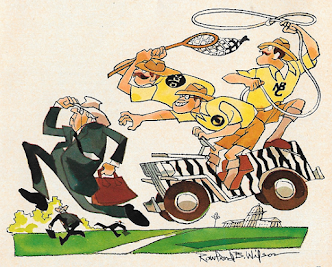 "I don't concern myself too much with what the other shows are doing," Lawrence Spivak, moderator of NBC's Meet the Press and dean of the Sunday interview programs, tells Neil Hickey. Despite this calm exterior, Hickey notes, "privately he pursues potential guests with all the tenacity of a ferret." It's a "highly competitive" process, according to Prentiss Childs, co-producer of CBS's Face the Nation. "As long as we're all thinking about the major news stories of any given week, we're bound to be crashing into each other in the booking of guests." Adds Peggy Whedon of ABC's Issues and Answers, "I have lunch with various contact people three or four days a week. I try to stay highly visible on the Washington scene, and get my bids in early."
"I don't concern myself too much with what the other shows are doing," Lawrence Spivak, moderator of NBC's Meet the Press and dean of the Sunday interview programs, tells Neil Hickey. Despite this calm exterior, Hickey notes, "privately he pursues potential guests with all the tenacity of a ferret." It's a "highly competitive" process, according to Prentiss Childs, co-producer of CBS's Face the Nation. "As long as we're all thinking about the major news stories of any given week, we're bound to be crashing into each other in the booking of guests." Adds Peggy Whedon of ABC's Issues and Answers, "I have lunch with various contact people three or four days a week. I try to stay highly visible on the Washington scene, and get my bids in early." One of the key players in the whole process doesn't work for a network at all; as director of communications for President Nixon, Herb Klein answers to a higher power. "My office acts as a coordinating element. One thing we do is assist the shows in breaking loose the people they want to interview." If one of the producers lets him know they're interested in, say, Senator X, "I might call that senator and chat with him about why I think he should go on. Or I might advise him not to go on at that particular time." Such is Klein's expertise, and level of trust within the White House, he doesn't even have to confer with the President before taking such action.
Each of the shows has had its share of memorable guests. Sometimes it's being in the right place at the right time; the guest on the very first Meet the Press (August 27, 1948) was Whittaker Chambers, who—unprotected by immunity of any kind—accused Alger Hiss, on the air, of being a Communist. Presidential candidate Barry Goldwater told Issues and Answers that low-yield nuclear weapons "might be useful in Vietnam to defoliate the jungles." Face the Nation scored big in 1964 when it landed Che Guevara, who was in New York to speak at the United Nations.
Other times it's a matter of being persistent. Spivak worked for 13 years to get Prince Philip, who "coolly" went on the show and confirmed that the royal household was all but broke. (Nowadays, you'd expect to see something like that on Oprah, although Philip has too much class for that.) And it was Peggy Whedon's hard work that brought off Issues and Answers' special primetime debate between Robert F. Kennedy and Eugene McCarthy, four days before the California primary—and RFK's shooting. Sometimes landing the right guest involves war zones, as was the case when Whedon interviewed King Hussein of Jordan, days after the end of the Six-Day War in 1967, arriving on a plane flying a zigzag course at night without lights, after Syria had threatened to shoot down any plane flying over its territory.
The all-time champ? That would be former vice president and presidential candidate Hubert Humphrey, who filled in on less than three hours' notice for a missing guest on Issues and Answers, arriving in the uniform he'd been wearing while playing baseball with some friends. He borrowed a shirt, tie and jacket from some stagehands, and the cameramen only photographed him from the waste up. Hubert was as smooth as ever—a fact which would surprise nobody who lived in Minnesota while he was here.
t t t
There's a feature in TV Guides of this era called "Second Look," written by Scott MacDonough, and I'll admit that the purpose of this totally escapes me. It's pretty much what it says it is: MacDonough takes a look at programs that recently aired and lets us know what he thought of them. It's not that I object to MacDonough, who does his job well, and often quite wittily. I just don't understand why this feature exists. In the days of VCRs or DVRs or TV on demand, yes—"Second Look" could tell you if that show you've recorded is worth hanging on to, or if you should press the delete button. But what good does it to do review a program that's already been on, unless it's to inform you about its viewing worthiness? Unlike the reviews by Judith Crist (movies) and Cleveland Amory (TV), this doesn't give you any advice about what to watch, because you already missed the chance. And if any of them are rerun, in a few months or so, what are the odds you're going to remember what MacDonough thought of them? I don't mind saying that I'm confused.
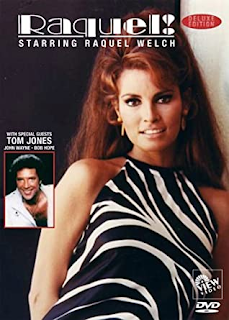 With Tom Jones, Bob Hope and
With Tom Jones, Bob Hope andJohn Wayne, no less!All that said, this week's column is immensely entertaining, with MacDonough looking back at a recent week littered—"and we do mean litter"—with specials that aren't, as it happens, very special. We begin with CBS's Raquel, starring "That ravishing robot Raquel Welsh," which may be a pleasant enough show to look at—but "unfortunately came equipped with a sound track," and it "presented Miss Welch's 'many talents' (CBS's words, not ours.)" In the course of the 60 minutes, Raquel goes on to pose philosophical questions ("Sometimes I feel paradoxical"), sing a few tunes ("Dum-deedle-dee-dum-deedle-dee-dum"), show off her sense of humor ("I don't know if I could dance with a glass of water on my head"), recite a bit of poetry ("Fawr grrrest walls an' fawr grrreat towahs"), and terrorize a field full of horses (no other description required).
Raquel is an example of something you see a lot in the 1970s and 1980s, the variety show hosted by someone you don't ordinarily associate with the genre. For example, Telly: Who Loves Ya, Baby . Whether shows like this are good or bad, what they accomplish is to give you the temperature of the times: who's hot, who's not. And while Raquel Welch is definitely hot, as MacDonough says, "We prefer our sex symbols laced with that intangible quality called talent. Paging Ann-Margret."
On the other hand, maybe I would remember this review the next time Raquel shows up in the listings.
t t t
Enough of all this! Let's watch some TV!
Country music's growing in popularity, as seen by a trio of shows this week, starting Saturday with Harper Valley U.S.A. (7:30 p.m. PT, NBC), named not, oddly enough, for host Jerry Reed, but for guest star Jeannie C. Riley's hit single, which she will naturally sing. Other guests include Earl Scruggs, Louis Roberts, Delaney & Bonnie & Friends (without, alas, Eric Clapton), and the Dillards, while Tom T. Hall, who wrote the title song, is among those providing comic relief. Wednesday, it's Hee Haw (7:30 p.m., CBS), with guests Merle Haggard and his wife Bonnie Owens, who doubles as the former wife of the show's co-host, Buck Owens. I absolutely can't think of a better scenario for a C&W song that that. And later Wednesday (9:00 p.m., ABC), it's the season finale of The Johnny Cash Show, with Tex Ritter, Roy Acuff, Marty Robbins, and Danny Davis and the Nashville Brass.
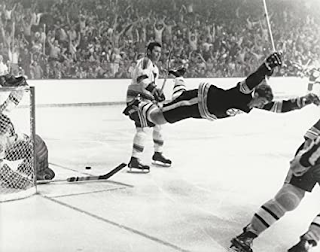 On Sunday it's a sports doubleheader, though you won't be able to watch them at the same time. At 11:00 a.m. on CBS, it's the fourth (and, as it happens, final) game of the Stanley Cup Final between the Boston Bruins and St. Louis Blues. Bobby Orr's overtime goal—one of the ◄ most iconic photos in sports history—gave the Bruins a 4-3 victory, and their first Stanley Cup in 29 years.
On Sunday it's a sports doubleheader, though you won't be able to watch them at the same time. At 11:00 a.m. on CBS, it's the fourth (and, as it happens, final) game of the Stanley Cup Final between the Boston Bruins and St. Louis Blues. Bobby Orr's overtime goal—one of the ◄ most iconic photos in sports history—gave the Bruins a 4-3 victory, and their first Stanley Cup in 29 years.At 12:30 on a special edition of ABC's Wide World of Sports, it's same-day coverage of Formula 1's most glamorous race of the year, the Grand Prix of Monaco. Jochen Rindt, with Price Rainier and Princess Grace in attendance, drives to a smashing victory over Jack Brabham and Henri Pescarolo. It's a bittersweet reminder of what auto racing was like in the day: Bruce McLaren, the champion driver and car designer who finishes 14th, is killed in an accident less than a month later. Rindt himself will be killed in practice for the Italian Grand Prix later in the season; he will become the sport's first (and, hopefully, only) postumous world champion.
Speaking of racing, former Indy 500 winer and future world champion Mario Andretti plays himself in It Takes a Thief (Monday, 7:30 p.m., ABC), an epsisode which also includes Dick Smothers, who was himself an avid racer. Mason Williams, musical guru for those same Smothers Brothers, and Grammy winner for "Classical Gas," is the focus on NET Festival (Tuesday, 9:00 p.m., NET). Sammy Davis Jr. makes a guest appearance on The Beverly Hillbillies (Wednesday, 8:30 p.m, CBS) as a New York policeman, in an episode partly filmed in the Big Apple. Orson Welles does a Shakespearean reading on The Dean Martin Show (Thursdasy, 10:00 p.m., NBC); Deano's other guests are Gina Lollobrigida, George Gobel and Charles Nelson Reilly; nice guest mix, isn't it? And on Friday, it's the aforementioned David Frost interview with Elizabeth Taylor and Richard Burton, (8:30 p.m., KPTV), with Burton doing some classical readings of his own. One of the questions we won't hear from Frost: did Liz ruin Burton's career? Enquiring minds want to know.
t t t
Last but not least, we have Peter Pflug's humorous piece on television violence. Peter is most assuredly a man after my own heart: "When I came home from work, cloted with choler and spoiling for a safe fight, I didn't take it out on my famly. Instead, I turned on television. After an hour or two filled with gunfire, screams and moans, I would find that all of my murderous fantasies had been massaged into nothingness."
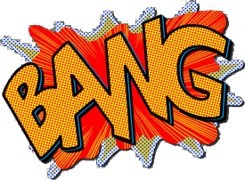 But now, of course, we're in the era of the war on violence (no pun intended), one of the lasting (for now, anyway) legacies from 1968. Networks have promised, under pain of government oversight, to clean up their act and provide entertainment that was at least a little bit kindler and gentler. Pflug doesn't mention any of this, merely decring the acts of the "do-gooders," the "infernal ladies' clubs and their write-in campaigns," but it's the background to the situation in which he now finds himself. "All but gone are the days when TV heroes returned from the edge of the grave to gouge and bit their way to happiness in the final 10 minutes before the kiddies were put to bed." When the hero laments that the villian is simply a product of his environment, that's when Pflug draws the line, storming out of the house to punch a couple of trees lest he do something even more disagreeable while inside.
But now, of course, we're in the era of the war on violence (no pun intended), one of the lasting (for now, anyway) legacies from 1968. Networks have promised, under pain of government oversight, to clean up their act and provide entertainment that was at least a little bit kindler and gentler. Pflug doesn't mention any of this, merely decring the acts of the "do-gooders," the "infernal ladies' clubs and their write-in campaigns," but it's the background to the situation in which he now finds himself. "All but gone are the days when TV heroes returned from the edge of the grave to gouge and bit their way to happiness in the final 10 minutes before the kiddies were put to bed." When the hero laments that the villian is simply a product of his environment, that's when Pflug draws the line, storming out of the house to punch a couple of trees lest he do something even more disagreeable while inside.And that's when he overheard a conversation between two men, discussing the same show he'd just been watching. "I've seen terrible in my time but never so terrible as that," said one man. His friend replied, "When that rat told the hero he'd stolen his dog and sold it to a laboratory, I thought sure he'd bought himself at least a karate chop. But the guy just stood there and said, 'I feel sorryh for ayone with so much hate inside.'" I feel his pain, even though the characters who actually deserIt've to feel pain manage to avoid it.
 It's very funny, but there's a point to it. I wrote a few years ago
at this very site
about Mickey Spillane's comment that what television needed was not less violence, but better violence. The act of seeing the bad guy punished—something that, as novelist Dorothy L. Sayers once pointed out, is essential to restoring the equilibrium of justice—is a cathartic event for the reader, or in this case the viewer, of a mystery. To remove that retributive violence through which justice is often dispensed is, in a way, a denial, a deprivation, of what the viewer not only wants but needs. To go without it leaves me, at the end, with a sour taste in my mouth. In this sense, television's relationship to violence is that not of a pressure cooker, but a pressure valve, a relesase to the accumulation of tensions in today's modern world.
It's very funny, but there's a point to it. I wrote a few years ago
at this very site
about Mickey Spillane's comment that what television needed was not less violence, but better violence. The act of seeing the bad guy punished—something that, as novelist Dorothy L. Sayers once pointed out, is essential to restoring the equilibrium of justice—is a cathartic event for the reader, or in this case the viewer, of a mystery. To remove that retributive violence through which justice is often dispensed is, in a way, a denial, a deprivation, of what the viewer not only wants but needs. To go without it leaves me, at the end, with a sour taste in my mouth. In this sense, television's relationship to violence is that not of a pressure cooker, but a pressure valve, a relesase to the accumulation of tensions in today's modern world. And you know what? Say otherwise and you'll get a punch in the nose. TV

Published on May 08, 2021 05:00
May 7, 2021
Around the dial

 We'll start this week by spending some time with Bob Sassone's review of "
The 100 Best Sitcoms of All Time
" list by Rolling Stone. I'll let you be the judge of this, but I don't generally think much of these lists, and neither does Bob. It goes not so much to the content of the list itself; I agree with some and disagree with others, and while I agree with much of what Bob says, he and I don't see eye-to-eye on all of them either.
We'll start this week by spending some time with Bob Sassone's review of "
The 100 Best Sitcoms of All Time
" list by Rolling Stone. I'll let you be the judge of this, but I don't generally think much of these lists, and neither does Bob. It goes not so much to the content of the list itself; I agree with some and disagree with others, and while I agree with much of what Bob says, he and I don't see eye-to-eye on all of them either. No; as he says, "Let’s face it: 'The 100 Best Sitcoms of All-Time' should just be called '100 Sitcoms,' because when you have a list that large you’re simply naming sitcoms that have existed." One hundred is way too large a number; why should anyone care what the 87th-best sticom of all time is? And then there's the guideline that the listmaker uses. Some shows appear simply to prove it's well-rounded, relevant; but lists like this—and, often, the writers who produce them—frequently suffer from recency bias, which means pretty much what it sounds like it should mean . And that's not the only kind of bias at work with these kinds of lists: the listmaker might have a bias against black-and-white shows, or shows made in England, or shows with female leads. We all have our own bias, but the job of a critic is to put those aside when making considered opinions. Bottom line, as Bob says: "Just give us what you think are the top sitcoms of all-time." And I haven't even gotten into the actual content—but what do you think about it?
While you're pondering that question, here's the rest of the best of the week. At MeTV, a great article on how John Astin initially wasn't sure that he was right to play Gomez Addams. Raul Julia aside, I can't imagine anyone else playing him, myself.
I don't play favorites here, but I will admit that few features have given me more pleasure over the years I've been doing this than Jack's Hitchcock Project pieces at bare•bones e-zine, and for his 250th review, he looks at William Fay's sixth-season episode "Gratitude," with Peter Falk and a stellar supporting cast.
I rarely pass up the opportunity to praise Burgess Meredith, who is always so good in whatever role he plays, from The Twilight Zone to Batman. At Classic Film & TV Cafe, Rick has his famous seven things to know about everyone's favorite penguin.
Television Obscurities flashes back to the 1956 sitcom Joe and Mabel (wonder if it was on the Rolling Stone list), and after reading Robert's article, I wonder if the show could ever have been as interesting as the story behind it?
Television's New Frontier: the 1960s brings us to the year 1962, as seen on Route 66 . It was the series' most successful year, ratings-wise, but also its most challenging, as George Maharis misses time (and eventually leaves the series) recovering from hepatitis.
A couple of remembrances: at The Lucky Strike Papers, Andrew recalls songstress Jill Corey , former star of Your Hit Parade; and at A Shroud of Thoughts, Terence celebrates Billie Hayes , whom we would remember as Witchiepoo in H.R. Pufnstuf.
Finally, at Comfort TV, David takes a look at one of the mainstays of classic television: the club scene . Not nightclubs—things like social clubs, after-school clubs, clubs for people with common interests. Of course, with the virus they probably wouldn't be meeting anyway, but as David points out, life doesn't seem to be like that anymore anyway (see Bowling Alone for more evidence), and I think we're the poorer for it. My wife and I are always looking for groups like those to join, but we also wonder why we're never invited to cocktail parties. The fact that we don't drink might have something to do with it. TV
Published on May 07, 2021 05:00
May 5, 2021
The once and future College Bowl

 What with the story that NBC is
bringing back the venerable
College Bowl next month, I thought it might be nice to recall this show, which was a staple of Saturday and Sunday afternoons for so many years and made so many of us feel so stupid.
What with the story that NBC is
bringing back the venerable
College Bowl next month, I thought it might be nice to recall this show, which was a staple of Saturday and Sunday afternoons for so many years and made so many of us feel so stupid. It won't be called G-E College Bowl, the name it carried from 1959 to 1970, this time around; that would probably have been too much to hope for. It will have a corporate sponsor, though: Capital One, which has had a long involvement with college sports, will be—well, they won't exactly be lending their name, will they? Among other things, they'll be paying out $1 million in scholarships. But I imagine it'll be a wise investment for them. Former pro quarterback Peyton Manning is the emcee, continuing the apparent trend of quarterbacks hosting game shows.
Anyway, here are clips from a couple of shows. As usual, we'll have a few observations afterwards.
The first is from October 9, 1960, when the series ran on CBS and was hosted by Allen Ludden. The contest pits two undefeated sides, Rutgers and Colgate. Enjoy the commercials!
The second match is later, from March 9, 1966. The show has moved from CBS to NBC, from black and white to color, and from Alan Ludden as host to Robert Earle. Our competitors this time are Princeton University and tiny Agnes Scott College in Decatur, Georgia; it's remembered aslo one of the most dramatic and famous contests in College Bowl history.
As one might expect, there's more to see here than a simple nostalgia for old television. From the purely technical side, the latter show is, as you would expect, a more polished and compelling production. The addition of color makes the graphics pop, and the repeated focus on the clock, with the sweep second hand approaching zero, enhances the sense of urgency and drama in the cliffhanger ending.
Robert Earle was, in my opinion, a far more compelling choice as host than the slightly smarmy Ludden, who just can't resist calling attention to himself in the best tradition of game show hosts.* Earle never lets his role detract from that of the students, and unlike Ludden seems far more at ease with the academic nature of the questions. One gets the idea that Earle might have been able to answer a few of the questions himself, whereas Ludden comes across as more condescending, reminding you that he's the host, whether he knows the answers or not—kind of like he was on Password, come to think of it.
*Rather like the difference between Bill Cullen and, say, Richard Dawson.
The questions themselves are challenging enough on their own, let alone having to answer them quickly, on live television in front of a studio audience, and before someone on the other side buzzes in. I always feel fortunate when I can answer even one or two of them. True, you could make the argument that the knowledge required to win is too specific, not as relevant to modern life, but that makes sense only when you look at college as a vocational tool rather than what it originally was, a place where the individual's knowledge is burnished and the student himself comes out as a more well-rounded person.*
*In fact, this spawns an entirely new question: the role of a college education in modern society. In an era when college degrees seem to be a requirement for all but the most menial jobs, with advanced degrees often preferred, have we gotten away from the original intent of higher education? Should we revisit the difference between a vocational college and one specializing in liberal arts? Do we put too much of a premium on college degrees, with the result a milieu of entitlement, debt and political indoctrination? Interesting questions all, ones that can easily be considered in the context of television's portrayal through the years, from a program like College Bowl to series such as Halls of Ivy, Hank and The Paper Chase.
Furthermore, the eternal struggle over college has always been a staple of family dramas and sitcoms, particularly in the mid-part of the century, when so many first generation Americans were under pressure to become the first in their family to attend college. At that point it was a mark not only of achievement but assimilation into the American way. Even then the tension existed between parents who wanted their children to do better than they did, to get that degree and then become a professional, a doctor or a lawyer, and children who wanted to follow their hearts and be a mechanic, a singer or an actress; in later years, we'd see those same children rebel against the system and become dropouts, peace activists, or non-profit advocates, much to the consternation of their parents. And except in the most frothy comedies, college is often portrayed as a struggle of pressure to achieve, measured against either the expectations of others or the student's own expectation.
In the end, do we perhaps see in television's portrayal of higher education an evolution in the depiction of college life, as the quest for knowledge becomes, instead, the quest for a better, higher-paying and more prestigious job?
Alas, probably a topic for another day.
And look at the students on College Bowl; my wife commented on how mature and poised they were, particularly the girls of Barnard. Cherry White*, for example, has a lot more moxie than people I've seen in the business world. Nerdish overtones, of course, but still very polished for college students. Even in 1966, when knowledge was becoming a weapon that students would use against the establishment, there's still something clean-cut and adult about the players. I remember my wife wondering, as we watched the episode, whether or not any of them wound up involved in campus riots or antiwar protests, or if any of the males died in Vietnam. The point is, would young people today be as poised, as adult, in a culture that seems to adore perpetual adolescence? Would they look as if they were headed for success, a cocktail party, or back to their parents' basements? (For that matter, would today's adults come across that way?)
*Whose actual first name, by the way, was "Heritage."
According to one source, General Electric dropped their sponsorship of College Bowl due to that very college unrest, after which the show disappeared from weekly airwaves. If that's true, then it's a sure a sign as any of the cultural upheavals enveloping the country, and a reminder of how that manifests itself on television. I wonder if there could be any kind of backlash like that today, or if it will just be seen as entertainment by the niche audience that all of TV has become?
Anyway, one thing's for sure: if Peyton Manning can't cut it, the producers can always turn to Aaron Rodgers. Right? TV
Published on May 05, 2021 05:00
May 3, 2021
What's on TV? Tuesday, May 5, 1953

 It's ironic how things sometimes work. On Saturday, when I was talking about the George Bernard Shaw play on Omnibus, I mentioned "Pygmalion" as one of the many famous plays that Shaw had written—and lo and behold, here it is, on WBKB at 8:00. See it up there? I love it when that kind of thing happens. Otherwise, it's a quiet TV day in Chicagoland (aside from Milton Berle's Texaco Star Theater, which was never quiet), one filled with the anthologies that were so popular in the 1950s. And Frank Reynolds giving the weather—let's just hope they
get the forecast right
.
It's ironic how things sometimes work. On Saturday, when I was talking about the George Bernard Shaw play on Omnibus, I mentioned "Pygmalion" as one of the many famous plays that Shaw had written—and lo and behold, here it is, on WBKB at 8:00. See it up there? I love it when that kind of thing happens. Otherwise, it's a quiet TV day in Chicagoland (aside from Milton Berle's Texaco Star Theater, which was never quiet), one filled with the anthologies that were so popular in the 1950s. And Frank Reynolds giving the weather—let's just hope they
get the forecast right
.4 WBBM (CBS) 9:00 Wheel of Fortune—Quiz 9:45 Meet Betty Furness—Ideas 10:00 News At Ten—Information 10:05 There’s One in Every Family 10:30 Strike It Rich—Quiz 11:00 Bride & Groom—TV Wedding 11:15 Love Of Life—Serial Story 11:30 Search For Tomorrow—Serial 11:45 Guiding Light—Drama Serial 12:00 Luncheon With Billy—Musical 12:25 Lee Philip Show—Hints 12:30 Garry Moore Show—Variety Topic: Einstein’s theory 1:00 Freedom Rings—Quiz Game 1:30 Art Linkletter’s House Party Guest: Richard Maddox 2:00 Big Payoff—Quiz For Men 2:30 Eddie Albert Show—Variety 3:00 Shopping With O’Riley 3:15 “Someone At The Door” MOVIE 4:30 Garfield Goose And Friend 5:00 Kids Karnival Kwiz—Games 5:30 Silhouettes Of The West—Music 5:45 Chgo. Weather—F. Reynolds 5:50 Guest Star—Carmelita Pope 6:00 Sports & Comments—Elson 6:15 News With Fahey Flynn 6:30 CBS News—Douglas Edwards 6:45 Jane Froman’s U.S.A. Canteen 7:00 “STAGECOACH” MOVIE 8:00 CITY HOSPITAL—--Drama 8:30 SUSPENSE—Drama “The Suitor” 9:00 DANGER—Mystery Drama “Last Stop Before Albany” 9:30 THE UNEXPECTED—Drama “The Man From Yesterday” 10:00 VIC PERRY—Man On The Street 10:15 HARRINGTON ON SPORTS 10:25 CHGO. WEATHER—Reynolds 10:30 CHGO. AT NIGHT—Chuck Bill 10:45 OUR SONG—Favorite Tunes 11:00 KUP’S TV COLUMN—Chats 11:15 11:15 EDITION—Fahey Flynn 11:30 MURDER BEFORE MIDNIGHT 12:00 “TWO WEEKS TO LIVE” MOVIE 1:20 LATE WORLD NEWS
5 WNBQ (NBC) 6:45 Town & Farm—Everett Mitchell 7:00 Today—Reports & Interviews 9:00 Ding Dong School—Nursery 9:30 Animal Playtime—Win Strake 10:00 Ask Washington –News Panel 10:30 Mrs. U.S.A.—Film Short (Or UN General Assembly Meeting) 11:00 Creative Cookery—Recipes 12:00 Noontime Comics—Kiddie Fun 12:30 Bob & Kay Show—Interviews 1:00 “Barefoot Boy” MOVIE 2:00 Break The Bank—Bud Collyer 2:30 Welcome Travelers—Chats 3:00 Kate Smith Hour—Variety 4:00 Hawkins Falls—Dramatic Tale 4:15 Gabby Hayes Show—Tall Tales 4:30 Howdy Doody Show—Puppets 5:00 Elmer, The Elephant—For Kids 5:30 To Be Announced 5:45 City Where I Live—Talk 5:50 Clifton Utley And The News 6:00 Joe Wilson’s Sports Corner 6:15 Short, Short Drama—Film 6:30 Dinah Shore Show—Musical 6:45 News Caravan—John Swayze 7:00 STAR THEATER—Comedy Guest: Ezio Pinza, Host: Milton Berle 8:00 FIRESIDE THEATER—Drama 8:30 CIRCLE THEATER—Drama “Sunday Storm” 9:00 TWO FOR THE MONEY—Quiz Herb Shriner hosts 9:30 CLUB EMBASSY—Musical 9:45 BOB CONSIDINE—News Views 10:00 WEATHERMAN—Clint Youle 10:15 CLIFTON UTLEY & THE NEWS 10:45 HERBIE MINTZ SHOW—Musical 11:00 HARNESS RACING—Maywood
7 WBKB (ABC) 9:30 Cartoons—Youngster’s Film 9:45 Beulah Karney Presents—Tips 10:30 Let’s Exercise With Ed Allen 10:50 Your Weather—Wayne Griffin 10:55 News With Ulmer Turner 11:00 Breakfast With Danny O’Neil 11:55 News With Ulmer Turner 12:00 Happy Pirates—Two Ton Baker 12:30 Time For Fun—Kids’ Show 12:55 News With Ulmer Turner 1:00 All About Baby—Ruth Crowley 1:15 “Woman In The Hall” MOVIE 2:25 News With Ulmer Turner 2:30 “Black Doll” MOVIE 3:00 “School For Husbands” MOVIE 3:55 News With Ulmer Turner 4:00 Lucky 7 Ranch—Western Film “Pinto Bandit” 5:00 Laugh Time—Film Shorts 5:30 Adv. Time With Bob Atcher “Hurrican Express” 6:00 Austin Kiplinger & The News 6:10 Sports Highlights—Jack Drees 6:25 Your Weather—Wayne Griffin 6:30 Beulah Show—Comedy Skits 7:00 “TOPPER RETURNS” MOVIE 8:00 “PYGMALION” MOVIE 9:30 NAME’S THE SAME—Panel Robert Q. Lewis emcees 10:00 NEWS—Austin Kiplinger 10:15 SPORTS HIGHLIGHTS—Drees 10:25 YOUR WEATHER—W. Griffin 10:30 HEART OF THE CITY—Film 11:00 NEWS WITH ULMER TURNER 11:10 “CALENDAR” MOVIE 11:30 NEWS—Les Nichols Comments 12:15 “CAPTAIN CAUTION” MOVIE
9 WGN (DuMont) 9:00 Your Figure Ladies—Exercises 9:30 Clete Roberts’ World Report 9:45 Earl Nightingale Program 10:00 A To Z Of Cookery—Recipes 11:00 “Broken Lives” MOVIE 12:00 Hi Ladies—Interview Fun 12:45 News Of The Day—S. Allen 1:00 “Highway 13” MOVIE 2:00 Paul Dixon Show—Music 3:00 “School For Husbands” MOVIE 5:00 Time For Beany—Kiddie Fun 5:15 Talent Time—Linn Burton 5:30 Robert F. Hurliegh—News 5:45 Sports Review—Brickhouse 6:00 Captain Video—Adventures 6:30 Spencer Allen & The News 6:45 Chicagoland Newsreel—News 7:00 LIFE IS WORTH LIVING—Talk 7:30 PRESS CONFERENCE—--Debate 8:00 “DORY FISHERMAN”—Film 8:30 WISDOM OF THE AGES—Panel Jack Barry emcees 9:00 48TH STREET THEATER—Drama “A Child In The House” 9:30 DOUG. FAIRBANKS JR.—Film 10:00 “JEWELS OF BRANDENBERG” MOVIE
TV
Published on May 03, 2021 05:00
May 1, 2021
This week in TV Guide: May 1, 1953

 If you follow European soccer, or if you've been surfing through sports sites the last couple of weeks, then you know the role played by fans in the failure of the recently proposed Super League. Moral of the story: never underestimate the power of the public. Television, too, has experienced moments when viewers have collectively exerted their influence to change the minds of network corporate suits in the executive suites, all the way back to the early days of the medium. Case in point this week: the "triumphant" return of Ted Mack's Original Amateur Hour, for which, as the cover says, you were responsible.
If you follow European soccer, or if you've been surfing through sports sites the last couple of weeks, then you know the role played by fans in the failure of the recently proposed Super League. Moral of the story: never underestimate the power of the public. Television, too, has experienced moments when viewers have collectively exerted their influence to change the minds of network corporate suits in the executive suites, all the way back to the early days of the medium. Case in point this week: the "triumphant" return of Ted Mack's Original Amateur Hour, for which, as the cover says, you were responsible.The progenitor of Star Search, American Idol and all other talent shows dates to 1934, when it premiered on radio under the direction of Major Edward Bowes, and made its way to television on DuMont in 1948 with Mack, who had become host after Bowes' death. By 1952, the show was being aired on NBC, and had become something of an institution; its disappearance from the airwaves, however brief, was sure to cause a stir.
The circumstances of Amateur Hour's temporary hiatus, starting in September 1952, are interesting enough, and wholly a part of the era of sponsors controlling television content. The show's tobacco company sponsor (unnamed in the TV Guide article, but it was the Old Gold brand of R.J. Reynolds) wanted to cut the running time to a half-hour. Mack and the producers refused, and took the show on a highly successful national tour, including a stop to entertain the troops in Korea. NBC was flooded with "thousands of letters, wires and phone calls" urging a return of the show. Sure enough, the network found a place for Mack and Amateur Hour, and it returned in April.
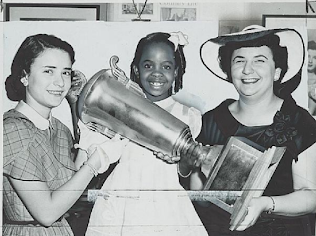 Gladys Knight, 7 years old, was a winner in 1952Reasons for the cancellations of popular shows vary. Some become the victim of a capricious sponsor that discontinues its financial support for one reason or another, leaving the old series with no visible way of getting on the schedule. The soap opera One Man's Family, despite its popularity, is one such example; its sponsor dropped the show because of rising costs, but it continues to be successful on radio. Danny Thomas and Jerry Lester, two popular entertainers of the time, left because of contractual demands, while programs like The Goldbergs couldn't find a place on schedules increasingly being filled by network-produced shows. In those cases there's little to do but bide one's time until a slot opens.
Gladys Knight, 7 years old, was a winner in 1952Reasons for the cancellations of popular shows vary. Some become the victim of a capricious sponsor that discontinues its financial support for one reason or another, leaving the old series with no visible way of getting on the schedule. The soap opera One Man's Family, despite its popularity, is one such example; its sponsor dropped the show because of rising costs, but it continues to be successful on radio. Danny Thomas and Jerry Lester, two popular entertainers of the time, left because of contractual demands, while programs like The Goldbergs couldn't find a place on schedules increasingly being filled by network-produced shows. In those cases there's little to do but bide one's time until a slot opens.Mack's return, however, has given fans hope that their favorites might make a comeback, whether from viewer pressure, new sponsorship, or the vagaries of the schedule. The popular sitcom Ethel and Albert is one such program risen from the dead, and Thomas is returning in a new sitcom, Make Room for Daddy, this fall. So for all those crowd-sourced combacks of the last few years that have resulted in the rebirth of cult favorites, there was a precedent.
As for The Original Amateur Hour, it would continue on various networks for another seventeen years, finally being pushed out of its Sunday afternoon timeslot in 1970 when televised doubleheaders became a regular part of the NFL. Its list of discoveries remains impressive, with Gladys Knight, Pat Boone, Ann-Margret, Jose Feliciano, Irene Cara and Tanya Tucker.* Ted Mack, who hosted matinee movies and variety shows in the 1950s as well as Amateur Hour, retired from television having spent more time in front of the camera than anyone else to that time.
*You never know who you'll see pop up here: one contestant, according to the always-reliable Wikipedia, was young Louis Wolcott, who appeared in 1949 playing his violin. You probably know him better today as Louis Farrakhan.
It's safe to say, though, that none of those who appear during the television version's long run will measure up to the most famous winner from radio, a skinny singer from Hoboken, New Jersey named Frank Sinatra.
t t t

Chester Gould, the creator of the Dick Tracy comic strip, is well aware of the power of television, which he calls "a scientific miracle" that we're beginning to take in stride. But TV can be much more than a medium to beam our favorite entertainers into our living room: according to law enforcement officials nationwide, it's "another weapon in the never-ending war against crime."
Gould has always been keenly interested in the use of science to fight crime—after all, you're talking to the man who invented the two-way wrist radio in 1946, and saw it become a reality in 1952. Now he's speculating on what else the future might have in store: battery-powered TV cameras, for example, that could be installed in a suspect's room (with a warrant, one would hope) to monitor his movements. Or permanently mounted TV camerasr in bank vaults, jewelry stores, fur stores and the like, with the picture being viewed constantly at a nearby police station. TV could also be used to link police departments in various cities to help identify suspects.
Obviously, this has all become fact—you could accomplish more than that with an iPhone—but it's a lot easier to look back on it from nearly 70 years' experience. I've written many times over the years about the hopes that television's pioneers had when they considered television's potential, and we should look at Gould in the same way. After all, it takes some vision to see that there's more to TV crimefighting than Dragnet.
t t t
Speaking of television's potential, it sometimes seems to me that I talk too much about the highbrow stuff you never see on TV anymore—opera, live theater, classical music—and if I feel that way, I can only imagine how you must feel about it. Nevertheless, there's a reason why TV was taken seriously in its early days, not just by people involved in the industry, but those in the arts as well. Case in point is this week's episode of Omnibus (Sunday, 3:30 p.m. CT, CBS), which devotes the entire program to George Bernard Shaw's play "Arms and the Man." Shaw, who's only been dead for three years at the time of airing, authored such well-known plays as "Pygmalion," "Major Barbara," "Man and Superman," "Androcles and the Lion," "Saint Joan," and many more. And yet, according to TV Guide—and I have a hard time believing this, but since it's in print it must be true—this is "the first authorized presentation in the U.S. of any work" of Shaw's. (As opposed, I'd guess, to all those unauthorized garage theater presentations.) Presenting this on television suggests that someone must have thought the medium had some cultural value.
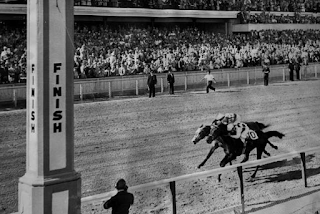 Close, but no cigar for Native DancerAs Chester Gould points out, TV is also an entertainment medium, and there's nothing more entertaining on Saturday than the 79th running of the Kentucky Derby (4:00 p.m., CBS). Unbeaten Native Dancer is the heavy favorite, butthe Gray Ghost is upset by Dark Star, who wins a neck. It is the only blemish in the Dancer's magnificent career; he wins both the Preakness and Belmont Stakes, and retires with 21 victories in 22 races. That race was seen on TV by 40 million viewers, or about 25 percent of the U.S. population; as Chester Gould said, TV is a scientific miracle, and it must have seemed a miracle to many that they could watch the celebrated race from the comfort of their home living room. I wonder how many ever got any closer to Churchill Downs than that?
Close, but no cigar for Native DancerAs Chester Gould points out, TV is also an entertainment medium, and there's nothing more entertaining on Saturday than the 79th running of the Kentucky Derby (4:00 p.m., CBS). Unbeaten Native Dancer is the heavy favorite, butthe Gray Ghost is upset by Dark Star, who wins a neck. It is the only blemish in the Dancer's magnificent career; he wins both the Preakness and Belmont Stakes, and retires with 21 victories in 22 races. That race was seen on TV by 40 million viewers, or about 25 percent of the U.S. population; as Chester Gould said, TV is a scientific miracle, and it must have seemed a miracle to many that they could watch the celebrated race from the comfort of their home living room. I wonder how many ever got any closer to Churchill Downs than that?t t t
Some of the other highlights of the week:
Ed Sullivan faces off aganst Colgate Comedy Hour, hosted by Dean Martin and Jerry Lewis, on Sunday night at 7:00; Ed's really big shew features Clifton Webb and Barbara Stanwyck in a filmed preview of their new movie Titanic; Joe Louis in his TV song & dance debut; and Diesso Tatto, a wire walker from the circus. Against this, Dean and Jerry offer singer Mary McCarty. and a skit about a TV set which gets only Martin & Lewis on all channels. As much as I like the boys, I think Ed wins this one hands-down. (Or a titanic win, if you prefer.)
 Garry Moore guest hosts on Arthur Godfrey's Talent Scouts (Monday, 7:30 p.m, CBS) while the Old Redhead undergoes double hip surgery on May 6 at Mass General, under the car of the famed orthopaedic surgeon
Dr. Marius Smith-Petersen
.* It's a good thing Garry's hosting tonight; I'd hate to think you'd take the show into the hospital, scouting for a talented doctor.
Garry Moore guest hosts on Arthur Godfrey's Talent Scouts (Monday, 7:30 p.m, CBS) while the Old Redhead undergoes double hip surgery on May 6 at Mass General, under the car of the famed orthopaedic surgeon
Dr. Marius Smith-Petersen
.* It's a good thing Garry's hosting tonight; I'd hate to think you'd take the show into the hospital, scouting for a talented doctor.*Fact #1: TV Guide misspells the doctor's name as "Narius Smith-Peterson." Fact #2: Dr. Petersen died on June 16, just six weeks after operating on Godfrey.
On Wednesday, Kraft Theatre celebrates its sixth anniversary with recreations of scenes from some of the show's best-known productions. Kraft Theatre is television's oldest network series, having premiered on May 7, 1947, and boasts an impressive list of alumns: Grace Kelly, Anne Francis, Nancy Marchand, Ralph Meeker and Betty Hutton are among those counted as breakout stars from the show. When Kraft Theatre goes off the air on October 1, 1958, it's the last of the shows from the original Golden Age.
There's a show on Thursday night that appears in the listings as "Washington Rendezvous" (8:30 p.m., WGN), but turns out to be an episode of Fireside Theater. The plot: "A Hungarian-born wife of an Amer. diplomat is blackmailed & unable to tell her husband anything of her plight, they slowly become estranged." All I hear is Washington: Behind Closed Doors. (As pronounced by Howard Cosell.)
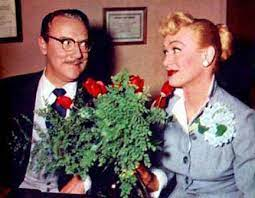 Eve Arden and Gale GordonAnd I'd be remiss if I didn't mention our cover girl for the week, Eve Arden. It's an indication of just how popular she was that she was on the cover of TV Guide so often; she graced at least three during the run of Our Miss Brooks. She's been playing America's favority teacher since 1946, when the radio version began; the show debuted on television in 1952. Having succeeded on stage, in the movies, and on radio and TV, you'd think Arden would have been on top of the world, but you'd be wrong. "I had all the things I wanted, but I couldn't enjoy them because of inner conflict," she says. "I felt a sense of responsibility for everyone whose life touched mine. It was a little like trying to play God." It took five years of psychoanalysis, and a happy second marriage, to actor Brooks West, for her to figure things out. "Because I couldn't help everybody, I constantly found fault with myself." She wishes she'd met Brooks years earlier; "Whenever I begin to worry, he stops me on the spot."
Eve Arden and Gale GordonAnd I'd be remiss if I didn't mention our cover girl for the week, Eve Arden. It's an indication of just how popular she was that she was on the cover of TV Guide so often; she graced at least three during the run of Our Miss Brooks. She's been playing America's favority teacher since 1946, when the radio version began; the show debuted on television in 1952. Having succeeded on stage, in the movies, and on radio and TV, you'd think Arden would have been on top of the world, but you'd be wrong. "I had all the things I wanted, but I couldn't enjoy them because of inner conflict," she says. "I felt a sense of responsibility for everyone whose life touched mine. It was a little like trying to play God." It took five years of psychoanalysis, and a happy second marriage, to actor Brooks West, for her to figure things out. "Because I couldn't help everybody, I constantly found fault with myself." She wishes she'd met Brooks years earlier; "Whenever I begin to worry, he stops me on the spot." Arden is much like the down-to-earth Connie Brooks she plays. She dresses simply, doesn't pose when she's not on-camera, and rarely goes to clubs, preferring to spend evenings and weekends at home with her husband and two adopted children, from whom she's never been away for more than two weeks at a time. She's pround of the fan mail she receives from teachers, considering she never had a chance to attend college herself—she wants this for her children, but only after they've spent "a year in the world." All in all, it's not a bad life being Eve Arden—or watching her.
t t t
Talk about "behind closed doors"—drama seethes behind the closed doors of WBBM, where "Popular Russ Reed, who was suddenly axed from channel 4's weather show, had reasons other than the elements for his dismissal. Seems Russ was giving a talk for a PTA group and turned up too late for his WBBM-TV stanza." So in other words, he was sacked for doing the station's PR—and did he even get paid extra for that? And it's not as if it was habitual; it "was the first show Reed missed since becoming a TV weatherman." That happens today, it probably winds up in court. Don't worry about the weather, though: "Frank Reynolds is now doing the barometer readings in Russ' place." Yes—that Frank Reynolds.
In other industry news, Dragnet's sponsor (Liggett & Myers) has indicated Jack Webb that they're renewing the series for another season. As I mentioned in the lede, the sponsors exerted a tremendous amount of influence over the schedule back then, although I think NBC would have been happy to renew the series anyway.
Rumor has it that Bing Crosby's headed for TV this fall, specifically CBS. Der Bingle's scheduled to timeshare with Fred Waring's music show and G.E. Theater. Waring will do two shows a month, while Crosby and G.E. hold down the other two. Don't hold yoir breath, though; when it comes time for the fall season, it's just G.E. and Waring sharing the spot.
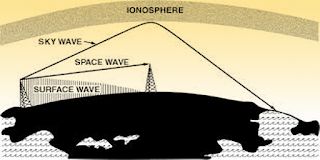 Finally, NBC has a surprise planned for next month's coverage of Queen Elizabeth's Coronation: "NBC engineers, secretly experimenting with a high-powered directional antenna on Long Island, have succeeded in bringing in a live TV picture directly from BBC in London." Keep in mind, this is long before satellites made global coverage commonplace; "They bounce the British signal off the ionosphere. The picture is fuzzy but NBC hopes it will be good enough to use occasionally in covering the Coronation June 2." And I go back to Chester Gould's "scientific miracle" description. A lot of people still don't have TVs in their home, or maybe just got one; for most people, the reality of TV is less than ten years old. And yet they might be sitting at home, seeing a live picture from London. Bounced off the atomosphere. If that isn't a scientific miracle, I don't know what is. TV
Finally, NBC has a surprise planned for next month's coverage of Queen Elizabeth's Coronation: "NBC engineers, secretly experimenting with a high-powered directional antenna on Long Island, have succeeded in bringing in a live TV picture directly from BBC in London." Keep in mind, this is long before satellites made global coverage commonplace; "They bounce the British signal off the ionosphere. The picture is fuzzy but NBC hopes it will be good enough to use occasionally in covering the Coronation June 2." And I go back to Chester Gould's "scientific miracle" description. A lot of people still don't have TVs in their home, or maybe just got one; for most people, the reality of TV is less than ten years old. And yet they might be sitting at home, seeing a live picture from London. Bounced off the atomosphere. If that isn't a scientific miracle, I don't know what is. TV
Published on May 01, 2021 05:00
April 30, 2021
Around the dial

 That could have been me up there in that picture, the little kid watching television so intently. If I'd had a chair like that. And if I was blond. And if we'd had wallpaer like that in our living room. Yep, could have been me. But I digress.
That could have been me up there in that picture, the little kid watching television so intently. If I'd had a chair like that. And if I was blond. And if we'd had wallpaer like that in our living room. Yep, could have been me. But I digress.At Cult TV Blog, it's another week of The Avengers; this time, it's all the way back to the first season, as John looks at the reconstruction of " Toy Trap ," with Steed and Keel (Patrick Macnee and Ian Hendry) investigating a prostitution ring.
That's not the only Brit show on the list; at Fire-Brething Dimetrodon Time, Grant reviews " An Author In Search Of Two Characters ," an episode of Jason King, the 1971-72 action series about an novelist whose trips invariably wind up involving him in adventures to rival his own books. Plenty of Avengers alums in this series.
" Bob Gets Neighborly " in this 1957 episode of Love That Bob!, and if you don't know what kind of trouble that could cause, Hal's here to tell us about it at The Horn Section. How does Bob make out? As if we didn't know.
I thoroughly enjoyed writing last week's piece on Peter Falk and Columbo , so naturally I'm going to see what Rick has to say about Falk's performance in the Neil Simon comedy The Cheap Detective over at Classic Film & TV Café. Come for Falk, and stay for Madeline Kahn and Dom DeLuise.
The Broadcasting Archives at the University of Maryland links to an article at CNBC that asks a serious question: how will local stations remain relevant in a world of streaming video? We've got a digital antenna to get our locals, but I've got to tell you, it's mostly the subchannels we watch.
At The Twilight Zone Vortex, it's theme week, as Jordan looks at the many TZ episodes in which a telephone plays a pivotal role . It's more than you might think, which reminds me of an article I wrote a few years ago on how cellphones would change the standard plots of many shows.
We all have our guilty pleasures, don't we? This week at Comfort TV, David looks at one of the "terrible shows I like": the 1988 series Eisenhower and Lutz . I have to admit that this show completely got past me; not only didn't I remember it when I first read David's article, I still didn't remember it the second time.
At Television Obscurities, Robert passes along the news about yet another classic TV diginet operating as a subchannel of one of your local stations. Rewind TV , from the people who brought us Antenna TV, will focus on sitcoms of the 1980s and 90s. Good for them, but I don't think I'll be tuning in.
I've written many times about my love of the space program since I was growing up, so I'll end this week with something completely unrelated to TV: Terence's tribute to the late, great Apollo 11 astronaut Michael Collins , at A Shroud of Throughts. Collins went on to head the magnificent Smithsonian Air & Space Museum, one of the coolest places I've ever visited. R.I.P., spaceman. TV
Published on April 30, 2021 05:00
April 28, 2021
The remarkable life of Harry Townes
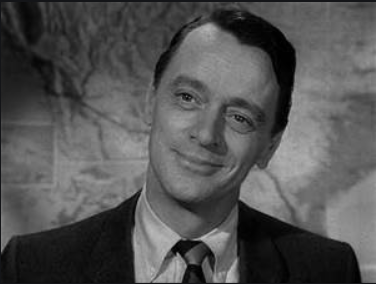
 You might not remember the name, but I'll bet you recognize the face. If you've spent any time in the classic TV world of the 1950s, the '60s, even the '70s and '80s, you've seen Harry Townes somewhere: Perry Mason, Gunsmoke, Thriller, The Fugitive, Bonanza, Star Trek, Mannix, The Incredible Hulk. During his long career as a character actor, he appeared on Broadway and in movies, and more than 200 television shows—he wasn't actually in everything; it just seems that way.
You might not remember the name, but I'll bet you recognize the face. If you've spent any time in the classic TV world of the 1950s, the '60s, even the '70s and '80s, you've seen Harry Townes somewhere: Perry Mason, Gunsmoke, Thriller, The Fugitive, Bonanza, Star Trek, Mannix, The Incredible Hulk. During his long career as a character actor, he appeared on Broadway and in movies, and more than 200 television shows—he wasn't actually in everything; it just seems that way. He frequently played flawed individuals: decent men who were weak when it came to doing the right thing; vulnerable men who lacked the strength to stand up to evil; indecisive men without the killer instinct to carry the day; corrupt men who betrayed the public trust; men who could be craven when courage was called for, but who might at the last minute find the strength to sacrifice themselves for the hero. Because of this, he was effective playing both good guys and bad guys, and he could keep you guessing until the end, rarely telegraphing the role he'd assume in the night's story. He was never a big star, but he was never out of work either. As he once said, "I feel I was lucky to get the work that I did. You always feel thankful because there are so many actors for so few jobs that it seems God is being good to you when you get a job."
And yet, if you only knew Harry Townes as an actor, you didn't really know him at all, nor did you know the work of which he was most proud.
Townes had become an actor in 1936, with several roles on Broadway and in other New York theaters, before enlisting in the Army. After a stint in the Air Corps during the war, he moved to Hollywood and resumed his acting career. While he was in his thirties, his sister Jean was diagnosed with terminal cancer. “Jean was told by several doctors that she had a terminal illness,” he said, “and X-rays bore them out.”
And then, one night, she had a vision. Townes didn’t go into the details of the vision, but "[T]he next morning when she awoke, she knew she was cured." Tests and X-rays followed, but her healing had been as complete as it was sudden; doctors found "not one trace" of cancer. "I knew then," he said, "that there was a power above man’s comprehension and that I was destined to enter the religious field."
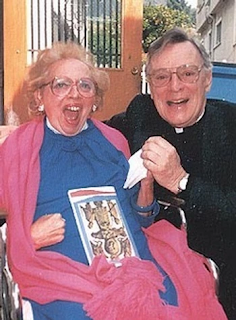 Fr. Townes and a parishioner, 1986He began taking philosophy courses at UCLA, then, while continuing his acting career, he put himself through seminary at the Bishop Bloy School of Theology in Los Angeles. He was ordained as a transitional deacon in 1973 and then, at age 59 and after ten years of study, he became Father Harry Townes in a ceremony at St. Paul's Episcopal Cathedral in Los Angeles on March 16, 1974. He was a nonstipendary priest, meaning he would continue to earn his living as an actor and would take no salary as a priest. There was, he felt, no conflict between acting and the priesthood; "The theater, too, is for goodness, truth and beauty."
Fr. Townes and a parishioner, 1986He began taking philosophy courses at UCLA, then, while continuing his acting career, he put himself through seminary at the Bishop Bloy School of Theology in Los Angeles. He was ordained as a transitional deacon in 1973 and then, at age 59 and after ten years of study, he became Father Harry Townes in a ceremony at St. Paul's Episcopal Cathedral in Los Angeles on March 16, 1974. He was a nonstipendary priest, meaning he would continue to earn his living as an actor and would take no salary as a priest. There was, he felt, no conflict between acting and the priesthood; "The theater, too, is for goodness, truth and beauty." For his first assignment, Father Townes was sent to St. Stephen's in Hollywood, where he worked with "alcoholics, dope addicts, and prostitutes," as well as those in need of spiritual help. "This is not my permanent parish," he explained to a journalist. "I might be assigned to other parishes at any given moment. And this is the way I desire it. I still want to continue my life as an actor as well as serving my fellow man."
He continued to serve in various roles, including at St Mary of the Angels Church in Hollywood and the Church of the Bells in Palm Springs, before retiring from acting in the late 1980s and returning to his hometown in Huntsville, where he resided until his death on May 23, 2001 at age 86.
A reporter once described Harry Townes as "an uncommon man who has found satisfaction as an actor and inner peace as a priest." Of his career, Townes offered an assessment that could double for his life after acting. "I guess we're never entirely happy with what we do; we would like to do better," he said. "Of course, I would have loved to have done better, we all would. But we always think we can do it better in one more take. On the whole, I'm satisfied, though. As long as the audience was satisfied, then I'm satisfied." I'd like to think that his Producer was satisfied with his peformance as well. TV
Published on April 28, 2021 05:00
April 26, 2021
What's on TV? Monday, April 25, 1966

 It occurs to me that I haven't paid enough attention to daytime shows in those little snapshots up there each week; usually I pick something from primetime. I've rectified that this week; remember Morning Star? Paradise Bay? Unfortunately, all the interesting shows today are in primetime. For example, KCMT's airing of McHale's Navy (probably a tape of last week's network run) goes all the way back to the show's first episode from 1962, when Ensign Parker joins McHale's crew, assigned by Captain Binghamton to whip them into shape. Like that worked well. Or Robert Preston hosting a tour of "The Surprising Middle West" on ABC's This Proud Land. And how can we overlook Dean Martin's guest shot on The Lucy Show in a dual role, playing both himself and his double. Good night of TV from the Minnesota State Edition, don't you think?
It occurs to me that I haven't paid enough attention to daytime shows in those little snapshots up there each week; usually I pick something from primetime. I've rectified that this week; remember Morning Star? Paradise Bay? Unfortunately, all the interesting shows today are in primetime. For example, KCMT's airing of McHale's Navy (probably a tape of last week's network run) goes all the way back to the show's first episode from 1962, when Ensign Parker joins McHale's crew, assigned by Captain Binghamton to whip them into shape. Like that worked well. Or Robert Preston hosting a tour of "The Surprising Middle West" on ABC's This Proud Land. And how can we overlook Dean Martin's guest shot on The Lucy Show in a dual role, playing both himself and his double. Good night of TV from the Minnesota State Edition, don't you think?-2- KTCA (EDUC.) Morning 9:00 CLASSROOM—Education Afternoon 3:30 AMERICANS AT WORK 3:45 TEACHING MATHEMATICS 5:00 KINDERGARTEN—Education 5:30 TEACHER TRAINING--Vocational Evening 6:00 SUPERVISORY PRACTICE 6:30 NOW SEE THIS 7:00 GUIDANCE PRINCIPLES 8:00 PROFILE—Discussion 8:30 HAMLINE UNIVERSITY 9:00 PLAYHOUSE—Wendell Josal 9:30 WORLD AFFAIRS 10:00 MONDAY FOR MEDICINE
-3- KDAL (DULUTH) (CBS) Morning 7:35 FARM AND HOME 7:45 TREETOP HOUSE—Miss Jane 8:00 CAPTAIN KANGAROO—Children 9:00 I LOVE LUCY—Comedy 9:30 McCOYS—Comedy 10:00 ANDY GRIFFITH—Comedy 10:30 DICK VAN DYKE—Comedy 11:00 LOVE OF LIFE 11:25 NEWS 11:30 SEARCH FOR TOMORROW—Serial 11:45 GUIDING LIGHT—Serial Afternoon 12:00 TOWN AND COUNTRY—Becker 12:30 AS THE WORLD TURNS—Serial 1:00 PASSWORD—Game Contestants: Carol Burnett, Soupy Sales 1:30 HOUSE PARTY COLOR Guest: Lynn Duffey 2:00 TO TELL THE TRUTH—Panel 2:25 NEWS—Edwards 2:30 EDGE OF NIGHT—Serial 3:00 SECRET STORM—Serial 3:30 ROUTE 66—Drama 4:00 BART’S CLUBHOUSE 4:30 SUPERMAN—Adventure 5:00 WOODY WOODPECKER—Cartoons COLOR 5:30 NEWS—Walter Cronkite COLOR Evening 6:00 NEWS 6:30 TO TELL THE TRUTH—Panel 7:00 I’VE GOT A SECRET—Panel 7:30 LUCILLE BALL COLOR 8:00 ANDY GRIFITH—Comedy COLOR 8:30 HAZEL COLOR 9:00 TALENT SCOUTS COLOR Presenters: Eddie Albert, Shirley Jones, Jack E. Leonard, Eleanor Powell. Host: Art Linkletter. 10:00 NEWS 10:15 MOVIE—Adventure “Zarak” (1957)
3 KGLO (MASON CITY) (CBS) Morning 7:30 NEWS—Mike Wallace 7:55 NEWS 8:00 CAPTAIN KANGAROO—Children 9:00 SPANISH 9:30 McCOYS—Comedy 10:00 ANDY GRIFFITH—Comedy 10:30 DICK VAN DYKE—Comedy 11:00 LOVE OF LIFE 11:25 NEWS 11:30 SEARCH FOR TOMORROW—Serial 11:45 GUIDING LIGHT—Serial Afternoon 12:00 NEWS 12:30 AS THE WORLD TURNS—Serial 1:00 LANDMARKS IN IOWA—History 1:30 HOUSE PARTY COLOR Guest: Lynn Duffey 2:00 TO TELL THE TRUTH—Panel 2:25 NEWS—Edwards 2:30 EDGE OF NIGHT—Serial 3:00 SECRET STORM—Serial 3:30 PASSWORD—Game Contestants: Carol Burnett, Soupy Sales 4:30 ROCKY AND HIS FRIENDS 4:45 BART’S CLUBHOUSE 5:00 WOODY WOODPECKER—Cartoons COLOR 5:30 NEWS—Walter Cronkite COLOR Evening 6:00 NEWS 6:30 TO TELL THE TRUTH—Panel 7:00 I’VE GOT A SECRET—Panel 7:30 LUCILLE BALL COLOR 8:00 ANDY GRIFITH—Comedy COLOR 8:30 HAZEL COLOR 9:00 TALENT SCOUTS COLOR Presenters: Eddie Albert, Shirley Jones, Jack E. Leonard, Eleanor Powell. Host: Art Linkletter. 10:00 NEWS 10:35 MOVIE—Drama “Paula” (1952)
-4- WCCO (CBS) Morning 6:00 SUNRISE SEMESTER—Education 6:30 SIEGFRIED—Children 7:00 TREETOP HOUSE—Children 7:30 CLANCY AND COMPANY 8:00 CAPTAIN KANGAROO—Children 9:00 DR. REUBEN K. YOUNGDAHL 9:05 NEWS—Dean Montgomery 9:10 MIKE DOUGLAS—Variety Co-host: Bette Davis. Guests: Phil Ford and Mimi Hines, Jerry Bergman 10:00 ANDY GRIFFITH—Comedy 10:30 DICK VAN DYKE—Comedy 11:00 LOVE OF LIFE 11:25 NEWS 11:30 SEARCH FOR TOMORROW—Serial 11:45 GUIDING LIGHT—Serial Afternoon 12:00 NEWS 12:15 SOMETHING SPECIAL 12:25 WEATHER—Bud Kraehling 12:30 AS THE WORLD TURNS—Serial 1:00 PASSWORD—Game Contestants: Carol Burnett, Soupy Sales 1:30 HOUSE PARTY COLOR Guest: Lynn Duffey 2:00 TO TELL THE TRUTH—Panel 2:25 NEWS—Edwards 2:30 EDGE OF NIGHT—Serial 3:00 SECRET STORM—Serial 3:30 I LOVE LUCY—Comedy 4:00 MOVIE—Adventure COLOR “Mark of the Renegade” (1951) 5:30 NEWS—Walter Cronkite COLOR Evening 6:00 NEWS 6:20 DIRECTIONS—Religion 6:25 WEATHER—Don O’Brien 6:30 TO TELL THE TRUTH—Panel 7:00 I’VE GOT A SECRET—Panel 7:30 LUCILLE BALL COLOR 8:00 ANDY GRIFITH—Comedy COLOR 8:30 HAZEL COLOR 9:00 TALENT SCOUTS COLOR Presenters: Eddie Albert, Shirley Jones, Jack E. Leonard, Eleanor Powell. Host: Art Linkletter. 10:00 NEWS 10:30 MERV GRIFFIN—Variety Guests: Jackie Robinson, Jack Carter, George Carlin, Bobby Rydell, Cleo Dawson 12:00 MOVIE—Western “Five Bold Women” (1959)
-5- KSTP (NBC) Morning 6:00 CONTINENTAL CLASSROOM 6:30 CITY AND COUNTRY COLOR 7:00 TODAY COLOR Guests: Book-of-the-Month Club executives 9:00 EYE GUESS—Game COLOR 9:25 NEWS—Newman 9:30 CONCENTRATION—Game 10:00 MORNING STAR—Serial COLOR 10:30 PARADISE BAY—Serial COLOR 11:00 JEOPARDY—Game COLOR 11:30 LET’S PLAY POST OFFICE—Game COLOR 11:55 NEWS Afternoon 12:00 NEWS AND WEATHER COLOR 12:15 DIALING FOR DOLLARS—Game COLOR 12:30 LET’S MAKE A DEAL—Game COLOR 12:55 NEWS—Floyd Kalber 1:00 DAYS OF OUR LIVES—Serial COLOR 1:30 DOCTORS 2:00 ANOTHER WORLD—Serial 2:30 YOU DON’T SAY!—Game COLOR Guests: Dwayne and Darryl Hickman. Host: Tom Kennedy 3:00 MATCH GAME COLOR Players: Henry Morgan, Bess Myerson. Host: Gene Rayburn 3:25 NEWS 3:30 DIALING FOR DOLLARS—Game COLOR 4:30 SUGARFOOT—Western 5:25 DOCTOR’S HOUSE CALL—James Rogers Fox COLOR 5:30 NEWS—Chet Huntley, David Brinkley COLOR Evening 6:00 NEWS COLOR 6:30 HULLABALOO COLOR Host: David McCallum. Guests: Brenda Lee, the Animals, the Beau Brummels, Peter and Gordon 7:00 JOHN FORSYTHE—Comedy 7:30 DR. KILDARE COLOR 8:00 PERRY COMO—Variety SPECIAL COLOR Guests: Ella Fitzgerald, Jack Burns and Avery Schrieber, Caterina Valente, John Davidson 9:00 RUN FOR YOUR LIFE—Drama COLOR 10:00 NEWS COLOR 10:30 JOHNNY CARSON—Variety COLOR Guests: George Jessel, Marilyn Maxwell, Wayne King 12:15 MOVIE—Drama “The Man Upstairs” (English; 1959)
-6- WDSM (DULUTH) (NBC) Morning 7:00 TODAY COLOR Guests: Book-of-the-Month Club executives 9:00 EYE GUESS—Game COLOR 9:25 NEWS—Newman 9:30 CONCENTRATION—Game 10:00 MORNING STAR—Serial COLOR 10:30 PARADISE BAY—Serial COLOR 11:00 JEOPARDY—Game COLOR 11:30 LET’S PLAY POST OFFICE—Game COLOR 11:55 NEWS Afternoon 12:00 GIRL TALK—Panel 12:30 LET’S MAKE A DEAL—Game COLOR 12:55 NEWS—Floyd Kalber 1:00 DAYS OF OUR LIVES—Serial COLOR 1:30 DOCTORS 2:00 ANOTHER WORLD—Serial 2:30 YOU DON’T SAY!—Game COLOR Guests: Dwayne and Darryl Hickman. Host: Tom Kennedy 3:00 MATCH GAME COLOR Players: Henry Morgan, Bess Myerson. Host: Gene Rayburn 3:25 NEWS 3:30 JACK LA LANNE COLOR 4:00 BOZO AND HIS PALS COLOR 5:30 NEWS, ROCKY TELLER COLOR Evening 6:00 NEWS—Huntley, Brinkley COLOR 6:30 HULLABALOO COLOR Host: David McCallum. Guests: Brenda Lee, the Animals, the Beau Brummels, Peter and Gordon 7:00 JOHN FORSYTHE—Comedy 7:30 DR. KILDARE COLOR 8:00 PERRY COMO—Variety SPECIAL COLOR Guests: Ella Fitzgerald, Jack Burns and Avery Schrieber, Caterina Valente, John Davidson 9:00 BOXING—Championship SPECIAL COLOR World Middleweight Championship: Dick Tiger vs. Emile Griffith 10:30 NEWS COLOR 10:50 JOHNNY CARSON—Variety COLOR Guests: George Jessel, Marilyn Maxwell, Wayne King
6 KAUS (AUSTIN) (ABC) Morning 10:00 SUPERMARKET SWEEP—Game 10:30 DATING GAME 11:00 DONNA REED—Comedy 11:30 FATHER KNOWS BEST Afternoon 12:00 BEN CASEY—Drama 1:00 CONFIDENTIAL FOR WOMAN—Serial 1:30 A TIME FOR US—Serial 1:55 NEWS—Marlene Sanders 2:00 GENERAL HOSPITAL 2:30 NURSES—Serial 3:00 NEVER TOO YOUNG 3:25 ARLENE DAHL COLOR 3:30 WHERE THE ACTION IS—Variety Performers: Lou Christie, the Knickerbockers, the Spencer Davis Group 4:00 CAPTAIN ATOM—Children Movie: “The Cowboy and the Senorita” (Western; 1944) 5:30 RIFLEMAN—Western Evening 6:00 NEWS—Bob Young 6:15 NEWS, SPORTS, WEATHER 6:30 MOVIE—Drama “The Blazing Forest” (1952) 8:00 THIS PROUD LAND—Documentary SPECIAL COLOR “The Surprising Middle West” Regular programs are pre-empted. 9:00 AVENGERS—Adventure 10:00 NEWS 10:30 UNTOUCHABLES—Drama 11:30 NEWS
-7- KCMT (ALEXANDRIA) (NBC, ABC) Morning 7:00 TODAY COLOR Guests: Book-of-the-Month Club executives 9:00 EYE GUESS—Game COLOR 9:25 NEWS—Newman 9:30 CONCENTRATION—Game 10:00 MORNING STAR—Serial COLOR 10:30 PARADISE BAY—Serial COLOR 11:00 JEOPARDY—Game COLOR 11:30 LET’S PLAY POST OFFICE—Game COLOR 11:55 NEWS Afternoon 12:00 NEWS 12:20 TRADING POST—Jon Haaven 12:30 LET’S MAKE A DEAL—Game COLOR 12:55 NEWS—Floyd Kalber 1:00 DAYS OF OUR LIVES—Serial COLOR 1:30 DOCTORS 2:00 ANOTHER WORLD—Serial 2:30 YOU DON’T SAY!—Game COLOR Guests: Dwayne and Darryl Hickman. Host: Tom Kennedy 3:00 MATCH GAME COLOR Players: Henry Morgan, Bess Myerson. Host: Gene Rayburn 3:25 NEWS 3:30 GENERAL HOSPITAL—Serial 4:00 FATHER KNOWS BEST—Comedy 4:30 BEATLES—Cartoon 5:00 CARTOONS—Children 5:30 NEWS—Chet Huntley, David Brinkley COLOR Evening 6:00 NEWS 6:30 HAVE GUN—WILL TRAVEL 7:00 JOHN FORSYTHE—Comedy 7:30 DR. KILDARE COLOR 8:00 THIS PROUD LAND—Documentary SPECIAL COLOR “The Surprising Middle West” Regular programs are pre-empted. 9:00 SURVIVAL!—Documentary 9:30 McHALES NAVY—Comedy 10:00 NEWS 10:30 12 O’CLOCK HIGH—Drama 11:30 PIONEERS—Drama
-8- WDSE (DULUTH) (EDUC.) Morning 9:00 CLASSROOM—Education Afternoon 3:30 AMERICANS AT WORK 3:45 TEACHING MATHEMATICS 5:00 KINDERGARTEN—Education 5:30 DUOLOGUE Evening 6:00 SUPERVISORY PRACTICE 6:30 WHAT’S NEW—Children 7:00 AMERICA’S CRISES SPECIAL “Crime in the Streets” 8:00 READING OUT LOUD—Literature 8:30 FRENCH CHEF—Cooking 9:00 VISITS WITH A SCULPTOR 9:30 WORLD AFFAIRS 10:00 MONDAY FOR MEDICINE
8 WKBT (LA CROSSE) (CBS) Morning 7:30 NEWS—Mike Wallace 7:55 NEWS 8:00 CAPTAIN KANGAROO—Children 9:00 I LOVE LUCY—Comedy 9:30 McCOYS—Comedy 10:00 ANDY GRIFFITH—Comedy 10:30 DICK VAN DYKE—Comedy 11:00 LOVE OF LIFE 11:25 NEWS 11:30 SEARCH FOR TOMORROW—Serial 11:45 GUIDING LIGHT—Serial Afternoon 12:00 NEWS 12:30 AS THE WORLD TURNS—Serial 1:00 PASSWORD—Game Contestants: Carol Burnett, Soupy Sales 1:30 HOUSE PARTY COLOR Guest: Lynn Duffey 2:00 TO TELL THE TRUTH—Panel 2:25 NEWS—Edwards 2:30 EDGE OF NIGHT—Serial 3:00 SECRET STORM—Serial 3:30 TV BINGO—Game 4:00 GENERAL HOSPITAL—Serial 4:30 MICKEY MOUSE CLUB—Children 5:00 WOODY WOODPECKER—Cartoons COLOR 5:30 NEWS—Walter Cronkite COLOR Evening 6:00 NEWS 6:30 TO TELL THE TRUTH—Panel 7:00 I’VE GOT A SECRET—Panel 7:30 LUCILLE BALL COLOR 8:00 ANDY GRIFITH—Comedy COLOR 8:30 HAZEL COLOR 9:00 FBI—Drama 10:00 NEWS 10:25 FILM SHORT 10:30 THE BARON—Adventure 11:30 ZANE GREY—Western
-9- KMSP (ABC) Morning 7:30 MY LITTLE MARGIE—Comedy 8:00 RILEY ‘ROUND THE TOWN 8:30 HENNESEY—Comedy 9:00 ROMPER ROOM—Miss Betty 10:00 SUPERMARKET SWEEP—Game 10:30 DATING GAME 11:00 DONNA REED—Comedy 11:30 FATHER KNOWS BEST Afternoon 12:00 BEN CASEY—Drama 1:00 CONFIDENTIAL FOR WOMAN—Serial 1:30 A TIME FOR US—Serial 1:55 NEWS—Marlene Sanders 2:00 GENERAL HOSPITAL 2:30 NURSES—Serial 3:00 NEVER TOO YOUNG 3:25 ARLENE DAHL COLOR 3:30 WHERE THE ACTION IS—Variety Performers: Lou Christie, the Knickerbockers, the Spencer Davis Group 4:00 ROUTE 6—Drama 5:00 NEWS—Bob Young 5:15 NEWS AND WEATHER 5:30 LEAVE IT TO BEAVER—Comedy Evening 6:00 YOGI BEAR—Cartoons COLOR 6:30 12 O’CLOCK HIGH 7:30 JESSE JAMES—Western 8:00 THIS PROUD LAND—Documentary SPECIAL COLOR “The Surprising Middle West” Regular programs are pre-empted. 9:00 AVENGERS—Adventure 10:00 NEWS 10:30 MOVIE—Western COLOR “The Mauraders” (1955)
10 WDIO (DULUTH) (ABC) Morning 10:00 SUPERMARKET SWEEP—Game 10:30 DATING GAME 11:00 DONNA REED—Comedy 11:30 FATHER KNOWS BEST Afternoon 12:00 BEN CASEY—Drama 1:00 CONFIDENTIAL FOR WOMAN—Serlal 1:30 A TIME FOR US—Serial 1:55 NEWS—Marlene Sanders 2:00 GENERAL HOSPITAL 2:30 NURSES—Serial 3:00 NEVER TOO YOUNG 3:25 ARLENE DAHL COLOR 3:30 WHERE THE ACTION IS—Variety Performers: Lou Christie, the Knickerbockers, the Spencer Davis Group 4:00 MOVIE—Western “Thunder over the Plains” (1953) 5:30 NEWS, SPORTS, WEATHER Evening 6:00 REBEL—Western 6:30 12 O’CLOCK HIGH 7:30 JESSE JAMES—Western 8:00 THIS PROUD LAND—Documentary SPECIAL COLOR “The Surprising Middle West” Regular programs are pre-empted 9:00 AVENGERS—Adventure 10:00 NEWS 10:15 MOVIE—Western “Cattle Town” (1952)
10 KROC (ROCHESTER) (NBC) Morning 7:00 TODAY COLOR Guests: Book-of-the-Month Club executives 9:00 EYE GUESS—Game COLOR 9:25 NEWS—Newman 9:30 CONCENTRATION—Game 10:00 MORNING STAR—Serial COLOR 10:30 PARADISE BAY—Serial COLOR 11:00 JEOPARDY—Game COLOR 11:30 LET’S PLAY POST OFFICE—Game COLOR 11:55 NEWS Afternoon 12:00 NEWS 12:15 SHOW AND TELL—Mary Bea 12:30 LET’S MAKE A DEAL—Game COLOR 12:55 NEWS—Floyd Kalber 1:00 DAYS OF OUR LIVES—Serial COLOR 1:30 DOCTORS 2:00 ANOTHER WORLD—Serial 2:30 YOU DON’T SAY!—Game COLOR Guests: Dwayne and Darryl Hickman. Host: Tom Kennedy 3:00 MATCH GAME COLOR Players: Henry Morgan, Bess Myerson. Host: Gene Rayburn 3:25 NEWS 3:30 BACHELOR FATHER—Comedy 4:00 LONE RANGER—Western 4:30 LEAVE IT TO BEAVER—Comedy 5:00 SERGEANT PRESTON 5:30 NEWS—Chet Huntley, David Brinkley COLOR Evening 6:00 NEWS 6:30 HULLABALOO COLOR Host: David McCallum. Guests: Brenda Lee, the Animals, the Beau Brummels, Peter and Gordon 7:00 JOHN FORSYTHE—Comedy 7:30 DR. KILDARE COLOR 8:00 BASEBALL—Twins Minnesota Twins at Detroit Tigers 10:30 NEWS, WEATHER, SPORTS Time Approximate 11:00 JOHNNY CARSON—Variety COLOR Guests: George Jessel, Marilyn Maxwell, Wayne King
11 WTCN (IND.) Morning 10:15 NEWS—Gil Amundson 10:30 MOVIE—Drama “The Royal Family of Broadway” (1930) Afternoon 12:00 LUNCH WITH CASEY—Children 1:00 MOVIE—Comedy “The Gilded Lily” (1935) 2:30 MEL’S NOTEBOOK—Interview 3:00 GIRL TALK—Panel Guests: Nancy Sinatra, Holly Turner, Muriel Franklin. Moderator: Virginia Graham 3:30 AMOS ‘N’ ANDY—Comedy 4:00 POPEYE AND PETE—Children 4:30 CASEY AND ROUNDHOUSE 5:30 WHIRLYBIRDS—Adventure Evening 6:00 WRESTLING—Minneapolis 7:30 HARMON KILLEBREW—Baseball 7:40 HALSEY HALL—Interviews 7:55 BASEBALL—Twins Minnesota Twins at Detroit Tigers 10:30 SCOREBOARD—Frank Beutel Time Approximate 10:45 NEWS, WEATHER, SPORTS Time approximate 11:15 MOVIE—Drama Time approximate “A Prize of Gold” (English; 1955) News follows the movie
12 KEYC (MANKATO) (CBS) Morning 7:30 NEWS—Mike Wallace 7:55 FILM SHORT 8:00 CAPTAIN KANGAROO—Children 9:00 I LOVE LUCY—Comedy 9:30 McCOYS—Comedy 10:00 ANDY GRIFFITH—Comedy 10:30 DICK VAN DYKE—Comedy 11:00 LOVE OF LIFE 11:25 NEWS 11:30 SEARCH FOR TOMORROW—Serial 11:45 GUIDING LIGHT—Serial Afternoon 12:00 NEWS 12:30 AS THE WORLD TURNS—Serial 1:00 PASSWORD—Game Contestants: Carol Burnett, Soupy Sales 1:30 HOUSE PARTY COLOR Guest: Lynn Duffey 2:00 TO TELL THE TRUTH—Panel 2:25 NEWS—Edwards 2:30 EDGE OF NIGHT—Serial 3:00 SECRET STORM—Serial 3:30 TAKE 12—Bob Gardner 4:00 BART’S CLUBHOUSE 4:30 ROCKY AND HIS FRIENDS 4:45 BART’S CLUBHOUSE 5:00 WOODY WOODPECKER—Cartoons COLOR 5:30 NEWS—Walter Cronkite COLOR Evening 6:00 NEWS 6:30 TO TELL THE TRUTH—Panel 7:00 I’VE GOT A SECRET—Panel 7:30 LUCILLE BALL COLOR 8:00 ANDY GRIFITH—Comedy COLOR 8:30 HAZEL COLOR 9:00 BANDWAGON—Earl Lamont 9:30 BATTLE LINE—Documentary 10:00 NEWS 10:35 MOVIE—Drama “Paula” (1952)
13 KEAU (EAU CLAIRE) (NBC) Morning 7:00 TODAY COLOR Guests: Book-of-the-Month Club executives 9:00 EYE GUESS—Game COLOR 9:25 NEWS—Newman 9:30 CONCENTRATION—Game 10:00 MORNING STAR—Serial COLOR 10:30 PARADISE BAY—Serial COLOR 11:00 JEOPARDY—Game COLOR 11:30 BINGO—Game 11:55 NEWS Afternoon 12:00 FARM AND HOME—Discussion 1:00 DAYS OF OUR LIVES—Serial COLOR 1:30 DOCTORS 2:00 ANOTHER WORLD—Serial 2:30 YOU DON’T SAY!—Game COLOR Guests: Dwayne and Darryl Hickman. Host: Tom Kennedy 3:00 MATCH GAME COLOR Players: Henry Morgan, Bess Myerson. Host: Gene Rayburn 3:25 NEWS 3:30 FATHER KNOWS BEST—Comedy 4:00 MILTON THE MONSTER 4:30 CASPER—Cartoons 5:00 BUGS BUNNY—Cartoons 5:30 NEWS—Chet Huntley, David Brinkley COLOR Evening 6:00 NEWS 6:30 HULLABALOO COLOR Host: David McCallum. Guests: Brenda Lee, the Animals, the Beau Brummels, Peter and Gordon 7:00 JOHN FORSYTHE—Comedy 7:30 DR. KILDARE COLOR 8:00 BASEBALL—Twins Minnesota Twins at Detroit Tigers 10:30 NEWS, WEATHER, SPORTS Time Approximate 11:00 SHENANDOAH—Western 11:30 MOVIE—Comedy “The Phantom President” (1932) TV
Published on April 26, 2021 05:00
April 24, 2021
This week in TV Guide: April 23, 1966

 A mostly interesting "compilation of opinions about Andy Williams" is Dwight Whitney's cover story, which leads off this week's clip-filled TV Guide review.
A mostly interesting "compilation of opinions about Andy Williams" is Dwight Whitney's cover story, which leads off this week's clip-filled TV Guide review.I'm usually suspicious of articles like this, which consist of no original writing whatsoever, just a collection of quotes that could have been dug up by a research assistant. However, it's a refreshing change from the celebrity hit pieces we read so often in this era of TV Guide, filled with snarky quotes from anonymous sources. This one reads more like an authorized biography, as we get quotes from friends, family, and past and present co-workers, telling the story of Andy's rise to his current celebrity. There's the odd sour quote, but the image that comes through is of a pretty good guy, one who's certainly ambitious and wants to succeed, but doesn't seem inclined to run over people in order to get there.
The most interesting thing to come from the story is how difficult it was for TV people to figure out what to do with Williams. Is he an urbane sophisticate, dating back to the time when he and his brothers performed with singer Kay Thompson ?* Or is he the farm boy from Iowa, the kid in a tuxedo on a tractor, as he once put it? Is he hip, simple, down-home, what?
*Fun fact: Although she had a successful singing career and was a mentor to Andy, she's best-known today as the author of the Eloise kids' stories, supposedly based on her goddaughter, Liza Minnelli.
The producer of his first television special, Bud Yorkin, puts it best when he says that "all he has to do is be himself." He can control the audience now, Yorkin says, because "At last he is in charge." And you know what? Simply being Andy Williams led to a pretty good career for Andy Williams, didn't it?
t t t
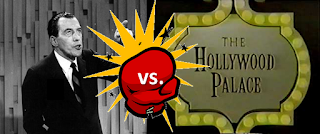 During the 60s, the Ed Sullivan Show and The Hollywood Palace were the premiere variety shows on television. Whenever they appear in TV Guide together, we'll match them up and see who has the best lineup..
During the 60s, the Ed Sullivan Show and The Hollywood Palace were the premiere variety shows on television. Whenever they appear in TV Guide together, we'll match them up and see who has the best lineup..Sullivan: Scheduled guests: comic Shelly Berman, satirist Allan Sherman, Metropolitan Opera soprano Roberta Peters, dancer José Greco, the rock 'n' rolling Dave Clark Five, the singing Kessler Twins, gospel singer Steve Sanders, magician John Moehring, comics Hendra and Ullett, and dancers Brascia and Tybee.
Palace: Host Victor Borge introduces singer Jane Powell, choreographer-dancer Peter Gennaro, comedian Irwin Corey, the singing Kim Sisters, and the Brothers Kim, instrumentalists, and Irish trapeze artist Gala Shawn.
This is from one of Victor Borge's funniest routines: phonetic punctuation. Although the clip's not from the Palace (it's from the Sullivan show, ironically), this is one of the bits he would have done on the show. I think Borge is terrific—always liked him, always thought he was funny. However, I'm not sure even he would have been enough to propel this week's Palace past Ed.
Quick quiz: who was the most frequent guest on the Ed Sullivan show? If you answered Roberta Peters, you'd be right. She appeared with Ed 65 times, more than anyone else. It's a testimony not only to the lost era of what Terry Teachout calls "middlebrow culture," but to the charm of Roberta Peters, who made her debut at the Metropolitan Opera when he was only twenty years old. Here's a sampler of her work from a previous appearance with Ed:
Besides Peters, Ed has a very strong lineup, what with Shelly Berman (who actually impressed me more as a dramatic actor than a standup), the wonderful Allan Sherman, and the great dis cancer José Greco. I think we've got a winner here: Sullivan hits the high notes this week.
t t t
No review this week from Cleveland Amory, because our favorite curmudgeon critic is reporting from Africa, U.S.A., the park about 50 miles northeast of Hollywood where most of today's television and movie wild animal scenes are filmed. The park—which includes a "jungleland" complete with Zulu villages, a "Beverly Hills" section for more urban scenes, and "more than 300 African, Asian and in fact, world-wide animals" including Clarence, the Cross-Eyed Lion—is co-owned and operated by animal trainer Ralph Helfer and television producer Ivan Tors, and houses animals "ranging from aardvarks, alligators and anteaters to Xipheosaras, yaks and zebras.
 Cheryl Miller with trainer Ted DerbyOn the day of Cleve's visit, Africa, U.S.A. is hopping with action: Marshall Thompson and Cheryl Miller of Daktari are filming a scene with a Bengal tiger on one stage; on another, a cheetah is attacking a hyena that's attacking actress Dina Merrill; and other stages feature a rhino charging a station wagon full of people and a baby lion and chimp on the back of a crocodile. Having all the animals together like this makes perfect sense; they're around people who know how to train them and take care of them properly; and the place is, as we see, well-equipped to handle any kind of simulated jungle that a director might require. Thompson says, "I've worked here every day for a year, and I still don't believe it."
Cheryl Miller with trainer Ted DerbyOn the day of Cleve's visit, Africa, U.S.A. is hopping with action: Marshall Thompson and Cheryl Miller of Daktari are filming a scene with a Bengal tiger on one stage; on another, a cheetah is attacking a hyena that's attacking actress Dina Merrill; and other stages feature a rhino charging a station wagon full of people and a baby lion and chimp on the back of a crocodile. Having all the animals together like this makes perfect sense; they're around people who know how to train them and take care of them properly; and the place is, as we see, well-equipped to handle any kind of simulated jungle that a director might require. Thompson says, "I've worked here every day for a year, and I still don't believe it."As we know, the humane treatment of animals is a high priority for Cleveland Amory, and I suspect that this was at least part of the story behind his trip to Africa, U.S.A. What is perhaps the money quote of the story appears when Tors discusses the importance of the project to him. "We live a phony existence," Tors tells Amory. "We don't underatand life and death. We fell out of rhythm with nature. We pretend we don't kill, but let others kill for us." He senses a change in the attitude society has regarding the treatment of animals. "[T]hree years ago, when a safari started out from the New Stanley Hotel in Narobi, the natives would cheer. Now they jeer. And right here in our country there's beginning to be an entirely different feeling about everything to do with animals—from hunting all the way to laboratory animals."
In January 1969, Africa U.S.A. is destroyed following severe flooding and mudslides; on the positive side, only nine of 1,500 animals drown. Eventually, it will be redeveloped as part of Marine World, and after relocating, it winds up as part of Six Flags Discovery Kingdom.
t t t
Can you believe it? ABC's Wide World of Sports celebrates its fifth anniversary this week (Saturday, 4:00 p.m. CT). What's fascinating about the clips shown in this special is how vividly it brings to life what kind of sports people paid attention to in 1966. There's Valery Brumel setting the world high-jump record, Bob Hayes with the 100-yard dash world record, and Jim Beattie becoming the first man ever to run a sub-four-minute mile indoors—all track and field events (which all played out as Cold War substitutes), none occurring during the Olympics, which is about the only time America pays attention to these events nowadays. Peggy Fleming, who's yet to win the Olympic gold, is featured in her recent victory at the U.S. Championships, and Scotsman Jim Clark wins the 1965 Indianapolis 500, while Arnold Palmer takes the crown in the 1962 British Open, a time before American stars routinely made the trip overseas to compete in the tournament.
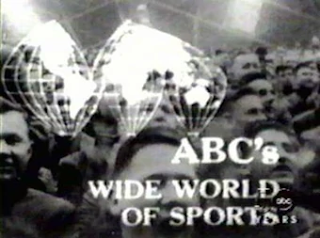 These events—track, golf, figure skating, auto racing—were, along with boxing, staples of Wide World for many years, and they're part of the reason I was such an avid fan of the show growing up. I got to see sports that weren't normally on television, often from exotic locales, sometimes live, almost always with a sense of drama and importance. There was, indeed, a feeling that these were on TV because they were special, as were the people competing in them.
These events—track, golf, figure skating, auto racing—were, along with boxing, staples of Wide World for many years, and they're part of the reason I was such an avid fan of the show growing up. I got to see sports that weren't normally on television, often from exotic locales, sometimes live, almost always with a sense of drama and importance. There was, indeed, a feeling that these were on TV because they were special, as were the people competing in them.Today, you can get most of these events pretty much any time you want, on any one of the all-sports networks out there. We've become used to them, or (as is the case with track) we've ignored them. In other words, seeing them on TV isn't special any more. And that's unfortunate.
Meanwhile, at 1:30 p.m. Sunday on NBC, it's Game 1 of the NHL's Stanley Cup Final between the Detroit Red Wings and Montreal Canadiens. Detroit's trying to win its first cup since the 1950s, while Montreal looks to make it seven out of the last eleven years.* The Wings take the opener in Montreal, 3-2; they'll also win Game 2 two nights later by the score of 5-2. Heading back home for two games, and only two wins away from the Cup, they'll lose the next four, and won't appear in the finals again until 1995.
*How times have changed, part 1,458: the Canadiens, winners of more Stanley Cups than any other team in history, last won the Cup in 1993—their longest drought in team history. The Wings, on the other hand, have won four during that span, the most recent coming in 2008.
t t t
Is this interesting only to me? In this week's editorial, Merrill Panitt wonders out loud whether or not it was necessary for all three networks to devote as much time as they did to the emergency splashdown of Gemini 8 on March 17. For those of you too young to remember this, the Gemini capsule piloted by Neil Aermstrong and David Scott began tumbling uncontrollably while in orbit on the first day of their mission. NASA decided to bring the capsule back as soon as feasible, and the astronauts splashed down safely that night 500 miles east of Okinawa. The drama—and, make no mistake, the astronauts were in real danger—lasted a little over four hours, from 7:15 to 11:25 p.m. ET. The networks provided continuous coverage throughout, preempting the entire prime-time schedule.
"We bow to no one in our concerns for teh astronauts' safety or own own respect for teh networks for throwing overboard so much advertising income," Panitt writes. However, he notes, was such in-depth coverage necessary? The lack of actual hard news meant that "Messrs. Bergman, Cronkite and Wallace, Brinkley and McGee ad-libbed, reiterated, stalled and generally tried to cover up the fact that they had nothing to report." Panitt suggests that the answer to all this is a system by which one network (on a rotating basis) provides continuous coverage, while the other two interrupt from time to time with updates, augmenting a running news ticker at the bottom of the screen.
Obviously, we can debate how one determines which news stories merit such extensive coverage, but Panitt points to a problem that is all-too real today: that of the need to fill a continuous 24/7 news cycle. As we've seen, our "news" channels answer that question by turning virtually every local news story into one of national importance worthy of saturation, simply filling the dead time with politically charged commentary that doesn't help in the least. Compared to what passes for news today, the Gemini 8 emergency coverge is hardly a blip on the screen.
t t t
And now, another episode of "Random Notes."
On Monday night at 9:00 p.m. Duluth's WDSM, Channel 6, is the only station in this issue carrying the syndicated broadcast of the world middleweight boxing championship fight from Madison Square Garden, pitting champion Dick Tiger against welterweight champ Emile Griffith. In an unpopular decision booed by the fans in the Garden, Griffith takes the title with a unanimous 15-round decision.
Tuesday's episode of McHale's Navy (7:30 p.m., ABC) presents a dilemma that remains one of television's great tropes: "An Italian signorina and her soldier boyfriend want to get married, but there's on one around to perform the ceremony—except possibly boat captain McHale." Which raises the question: can a ship's captain really marry people? Pertinent to this episode, the United States Navy says no: "The commanding officer shall not perform a marriage ceremony on board his ship or aircraft." And in non-military situations, a captain can only perform a marriage if he or she already has the authority: if, for example, the captain is a Notary Public, a recognized minister, a judge, or a justice of the peace. In other words, as a Notary, I can perform your marriage. It will cost you, though.
Our latest installment of "when television used to show classy dramas," presented without comment: Wednesday's Hallmark Hall of Fame presentation of "Lamp at Midnight" (6:30 p.m., NBC), the story of the epic conflict between Galileo and the Catholic Church, with an all-star cast including Melvin Douglas as Galileo, with David Wayne, Michael Hordern, Hurd Hatfield and Kim Hunter. (There's a nice color feature on the production elsewhere in the issue.) Interesting, isn't it, how the advertising tries to capitalize on the space program to attract viewers to a story that occurred 400 years ago?
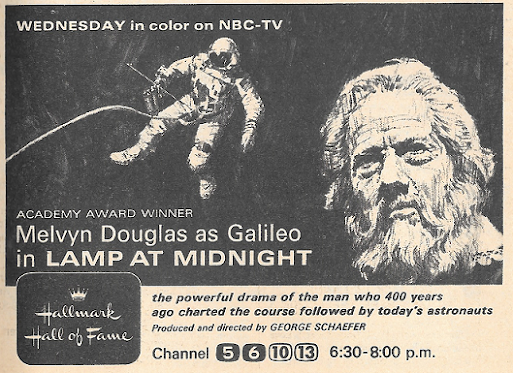
A couple of shows are worth mentioning on Thursday: first, it's the finale of this season's series of National Geographic specials (6:30 p.m., CBS), which also serves as a beginning of sorts. It's "The World of Jacques-Yves Cousteau," produced by David L. Wolper and narrated by Orson Welles, and it documents the famed undersea explorer's third journey to the continental shelf in his exploration capsule Conshelf Three. In 1968, the series The Undersea World of Jacques Cousteau will premiere on ABC (narrated first by Rod Serling and later by Joseph Campanella), and runs through 1976. At the same time on ABC, Batman does battle with the archfiend Riddler (Frank Gorshin) and his moll, Pauline (Sherry Jackson). And here's a question that parents probably found easier to deal with than the ones their kids usually come up with:
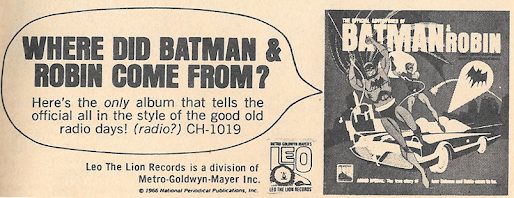
McHale's Navy isn't the only show this week to feature a matrimonial theme; on Friday, it's a repeat of The Farmer's Daughter's November episode (8:30 p.m., ABC) in which Katy (Inger Stevens) finally gets her man, marrying Congessman Glen Morley (William Windom). The Farmer's Daughter wasn't the first sitcom to feature a "very special" wedding; that would be Mister Peepers in 1954. But it was one of the earliest, and it personifies two traditions that continue to this day: the wedding episode is a ratings winner, and viewer interest in the series generally goes downhill from there. Why? Well, the wedding episode often serves as the culmination of a long-running theme, and as such eliminates the storyline (and tension) that has kept the series going. What more is left to say? (How many times have we heard viewers say that things "just aren't the same" after the wedding?" Probably as often as marriage counselors.) Does the wedding episode kill off a series, or does it simply conclude it? Chicken and egg.
t t t
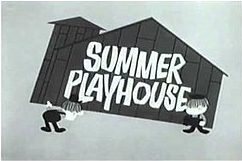 Speaking of that Farmer's Daughter episode, maybe it's just me, and the memory playing tricks, but I always thought the summer rerun season came later in the year, in May or (in some cases) even June. And yet here we are, in virtually the last week of April, and the reruns are starting: besides The Farmer's Daughter, Honey West, Flipper, The John Forsythe Show, The Addams Family, McHale's Navy and Daniel Boone are among those "beginning a series of reruns," while Perry Como's Kraft Music Hall airs its last show of the season, and Sing Along With Mitch returns "for a series of warm-weather reruns." Keep in mind that there were more episodes per series back then, oftentimes over 30*, and this suggests there weren't that many reruns shown outside of the summer season.
Speaking of that Farmer's Daughter episode, maybe it's just me, and the memory playing tricks, but I always thought the summer rerun season came later in the year, in May or (in some cases) even June. And yet here we are, in virtually the last week of April, and the reruns are starting: besides The Farmer's Daughter, Honey West, Flipper, The John Forsythe Show, The Addams Family, McHale's Navy and Daniel Boone are among those "beginning a series of reruns," while Perry Como's Kraft Music Hall airs its last show of the season, and Sing Along With Mitch returns "for a series of warm-weather reruns." Keep in mind that there were more episodes per series back then, oftentimes over 30*, and this suggests there weren't that many reruns shown outside of the summer season.*Of course, as a series progressed through several seasons and accumulated inventory, the annual number of episodes produced would generally go down, the gaps being filled in with episodes from years past.
The variety series is often a clue as to when summer actually arrives: Jackie Gleason, Red Skelton, Dean Martin and others take the summer off, with their slots being taken by those Summer Playhouse-type anthologies consisting of failed pilots, or a variety series hosted by a new young comic or singing star. (Glen Campbell! Vic Damone! George Carlin!) Jackie, Red and Dean are all on this week (albeit with a few reruns sprinkled in), so don't make those summer vacation plans quite yet. TV
Published on April 24, 2021 05:00
April 23, 2021
Around the dial
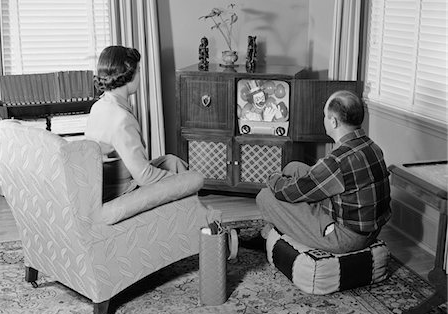
 Let's start off this week with Jack's latest Hitchcock Project at bare•bones e-zine. It's a new era for Hitchcock, having moved to NBC for its sixth season, and a different kind of story: "
The Contest for Aaron Gold
," adapted by William Fay from a short story by Phillip Roth, and featuring Sydney Pollack in one of his occasional acting roles.
Let's start off this week with Jack's latest Hitchcock Project at bare•bones e-zine. It's a new era for Hitchcock, having moved to NBC for its sixth season, and a different kind of story: "
The Contest for Aaron Gold
," adapted by William Fay from a short story by Phillip Roth, and featuring Sydney Pollack in one of his occasional acting roles.As I'm writing this, I note that it's Jack Nicholson's 84th birthday, but we're looking back to the young Jack with an attitude: 1970's Five Easy Pieces , nominated for four Academy Awards™. However, writes Rick at Classic Film & TV Café, it's possible the movie hasn't aged as well as Jack; read it and find out for yourself.
At Silver Scenes, the "Listen and Guess" game features : mystery recordings from well-known actors of movies and television, stars whose names might not immeditely come to mind when you think "recording artist." Head over there and see how many you can get!
The actor Felix Silla died this week aged 83, and if the name doesn't sound familiar, you'll surely remember his most famous role: Cousin Itt on The Addams Family. There's much more to his career than that, as Terence tells us in this nice remembrance at A Shroud of Thoughts.
" The Monster of Peladon " is a story from the Pertwee era of classic Doctor Who; as John points out at Cult TV Blog, it's not the show's greatest moment. It's a sequel to the superior "Curse of Peladon," and it covers a little too much of the same ground. But I'll still wager it's better than anything you'll see on the new Who, which I gave up on a long time ago.
Now, this is a story you have to love: " A Production Primer from Television's First Cameraman ," at Eyes of a Generation. Can you imagine beign recognized as the first-ever TV cameraman? I mean, how cool is that?
A fun article from JB at The Hits Just Keep On Comin', involving a 1970s high school literary magazine, a family who'd gotten rid of TV years ago, and the movie And Now For Something Completely Different. If that sounds like a recipe for disaster, consider the title, " The Night It Hit the Fan ."
No such troubles here; we'll be back tomorrow with, hopefully, a controversy-free issue of TV Guide. You never know, though. TV
Published on April 23, 2021 05:00
It's About TV!
Insightful commentary on how classic TV shows mirrored and influenced American society, tracing the impact of iconic series on national identity, cultural change, and the challenges we face today.
- Mitchell Hadley's profile
- 5 followers



